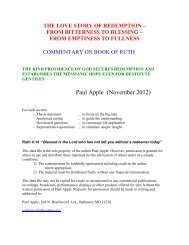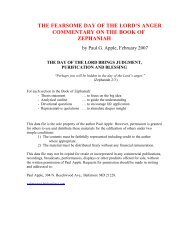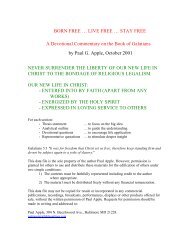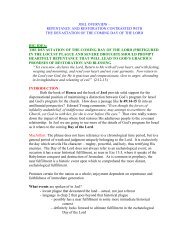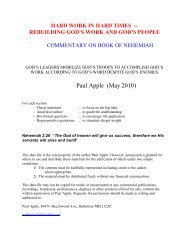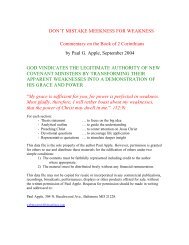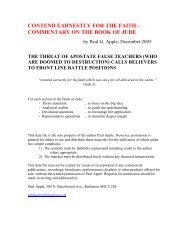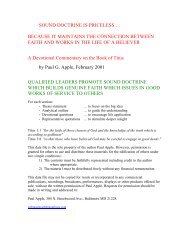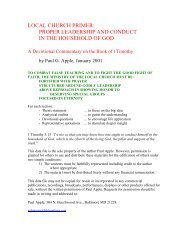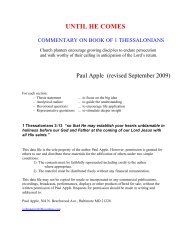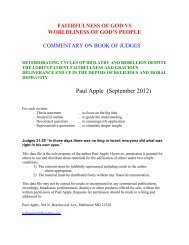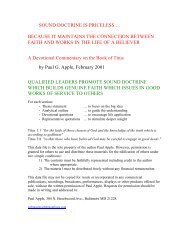in wrath remember mercy . . . the just shall live by faith - Free sermon ...
in wrath remember mercy . . . the just shall live by faith - Free sermon ...
in wrath remember mercy . . . the just shall live by faith - Free sermon ...
Create successful ePaper yourself
Turn your PDF publications into a flip-book with our unique Google optimized e-Paper software.
IN WRATH REMEMBER MERCY . . .THE JUST SHALL LIVE BY FAITH --COMMENTARY ON THE BOOK OF HABAKKUK<strong>by</strong> Paul G. Apple, December 2006THE LONG TERM CONVICTION OF FAITH EXULTS IN THE GODOF OUR SALVATION DESPITE THE PERPLEXING QUESTIONSOF THE PAIN AND APPARENT INJUSTICE OF OUR PRESENTCIRCUMSTANCES“In <strong>wrath</strong> <strong>remember</strong> <strong>mercy</strong>.”“The <strong>just</strong> <strong>shall</strong> <strong>live</strong> <strong>by</strong> <strong>faith</strong>.”(Habakkuk 3:2; 2:4)For each section <strong>in</strong> <strong>the</strong> Book of Habakkuk:- Thesis statement … to focus on <strong>the</strong> big idea- Analytical outl<strong>in</strong>e … to guide <strong>the</strong> understand<strong>in</strong>g- Devotional questions … to encourage life application- Representative quotations … to stimulate deeper <strong>in</strong>sightThis data file is <strong>the</strong> sole property of <strong>the</strong> author Paul Apple. However, permission is grantedfor o<strong>the</strong>rs to use and distribute <strong>the</strong>se materials for <strong>the</strong> edification of o<strong>the</strong>rs under twosimple conditions:1) The contents must be <strong>faith</strong>fully represented <strong>in</strong>clud<strong>in</strong>g credit to <strong>the</strong> authorwhere appropriate.2) The material must be distributed freely without any f<strong>in</strong>ancial remuneration.This data file may not be copied for resale or <strong>in</strong>corporated <strong>in</strong> any commercial publications,record<strong>in</strong>gs, broadcasts, performances, displays or o<strong>the</strong>r products offered for sale, without<strong>the</strong> written permission of Paul Apple. Requests for permission should be made <strong>in</strong> writ<strong>in</strong>gand addressed to:Paul Apple, 304 N. Beechwood Ave., Baltimore MD 21228.webmaster@bibleoutl<strong>in</strong>es.com
ABOUT THE AUTHORPaul majored <strong>in</strong> English at Pr<strong>in</strong>ceton University and graduated <strong>in</strong> 1979 with a Master ofDiv<strong>in</strong>ity degree from Grace Theological Sem<strong>in</strong>ary <strong>in</strong> W<strong>in</strong>ona Lake, IN. He <strong>live</strong>s <strong>in</strong> <strong>the</strong>Baltimore area with his wife Karen. He has worked <strong>in</strong> management roles for severallocal companies while engag<strong>in</strong>g <strong>in</strong> pastor<strong>in</strong>g and preach<strong>in</strong>g responsibilities at Solid RockCommunity Church. His four children (and one daughter <strong>in</strong> law) enjoy a wide range ofeducational and professional pursuits while shar<strong>in</strong>g <strong>in</strong> common a love for <strong>the</strong> Lord Jesus.
BACKGROUND OF BOOK OF HABAKKUKMalick: The surpris<strong>in</strong>g judgment which <strong>the</strong> Lord is go<strong>in</strong>g to br<strong>in</strong>g upon wicked Judahthrough <strong>the</strong> evil, idolatrous Ba<strong>by</strong>lonians does not compromise His goodness, butengenders <strong>faith</strong> because He will one day also judge <strong>the</strong> Ba<strong>by</strong>lonians and de<strong>live</strong>r Hispeople as <strong>the</strong>ir mighty warriorStedman: The prophet Habakkuk was a contemporary of <strong>the</strong> prophet Jeremiah, who isknown to us as <strong>the</strong> weep<strong>in</strong>g prophet, because he m<strong>in</strong>istered to <strong>the</strong> Sou<strong>the</strong>rn K<strong>in</strong>gdom ofJudah <strong>in</strong> <strong>the</strong> darkest days of its national history, <strong>just</strong> before <strong>the</strong> Ba<strong>by</strong>lonians sackedJerusalem and carried <strong>the</strong> people <strong>in</strong>to captivity. Habakkuk (his name means, "<strong>the</strong>embracer") also was <strong>in</strong> Jerusalem at that time, so he too saw all that went on.Piper: The situation which Habakkuk faces is <strong>the</strong> imm<strong>in</strong>ent <strong>in</strong>vasion of <strong>the</strong> sou<strong>the</strong>rnk<strong>in</strong>gdom of Judah <strong>by</strong> <strong>the</strong> Chaldeans (who are <strong>the</strong> same as <strong>the</strong> Ba<strong>by</strong>lonians). This <strong>in</strong>vasioneventually happened at <strong>the</strong> end of <strong>the</strong> sixth century B.C. and Jerusalem fell toNebuchadnezzar <strong>in</strong> 586 B.C. The Lord revealed to Habakkuk beforehand that Judah wasgo<strong>in</strong>g to be punished for her s<strong>in</strong> <strong>by</strong> <strong>the</strong> Chaldeans. Unlike Joel and Zephaniah and Amos,Habakkuk does not even mention <strong>the</strong> possibility that destruction could be averted. Hedoes not call for national repentance. It is too late. Instead, he predicts <strong>the</strong> destruction ofJudah and beyond that <strong>the</strong> doom of <strong>the</strong> Chaldeans <strong>the</strong>mselves. And he promises that <strong>the</strong>only way to preserve your life through <strong>the</strong> judgment is <strong>by</strong> <strong>faith</strong>. So even thoughdestruction is decreed for <strong>the</strong> nation, <strong>the</strong>re is hope for <strong>in</strong>dividuals who hold fast <strong>the</strong>irconfidence <strong>in</strong> God.Lu<strong>the</strong>r: His name speaks as one who took his nation to his heart, comforted it and held itup, as one embraces and presses to his bosom a poor weep<strong>in</strong>g child, calm<strong>in</strong>g andconsol<strong>in</strong>g it with good hope."McGee: This little book opens <strong>in</strong> gloom and closes <strong>in</strong> glory. It beg<strong>in</strong>s with a questionmark and closes with an exclamation po<strong>in</strong>t. Habakkuk is a big WHY? Why God permitsevil is a question that every thoughtful m<strong>in</strong>d has faced. I th<strong>in</strong>k that this book is <strong>the</strong>answer to that question. Will God straighten out <strong>the</strong> <strong>in</strong><strong>just</strong>ice of <strong>the</strong> world? This bookanswers that question. Is God do<strong>in</strong>g anyth<strong>in</strong>g about <strong>the</strong> wrongs of <strong>the</strong> world? This booksays that He is. In my op<strong>in</strong>ion it is possible to reduce <strong>the</strong> doubt of Thomas <strong>in</strong> <strong>the</strong> NewTestament, of Habakkuk <strong>in</strong> <strong>the</strong> Old Testament, and of modern man <strong>in</strong>to <strong>the</strong> one word:Why? It is <strong>the</strong> fundamental question of <strong>the</strong> human race.OUTLINE:I. PERPLEXITY of <strong>the</strong> Prophet (Chap. 1)1. First Problem of <strong>the</strong> Prophet, 1:1-4Why does God permit evil?2. God’s Answer, 1:5-11God was rais<strong>in</strong>g up Chaldeans to punish Judah (v.6)
3. Second Problem of <strong>the</strong> Prophet (greater than <strong>the</strong> first), 1:12-17Why would God permit His people to be punished <strong>by</strong> a nationmore wicked than <strong>the</strong>y? Why did He not destroy <strong>the</strong> Chaldeans?II. PERCEPTION of <strong>the</strong> Prophet (Chap. 2)1. Practice of <strong>the</strong> Prophet, 2:1He took <strong>the</strong> secret problem to <strong>the</strong> secret place.2. Patience of <strong>the</strong> Prophet, 2:2,3He waited for <strong>the</strong> vision.3. Pageant for <strong>the</strong> Prophet, 2:4The great divide <strong>in</strong> humanity: One group, which is crooked, is flow<strong>in</strong>gtoward destruction; <strong>the</strong> o<strong>the</strong>r group, <strong>by</strong> <strong>faith</strong>, is mov<strong>in</strong>g toward God. Thisis <strong>in</strong>evitable.4. Parable to <strong>the</strong> Prophet, 2:5-20The application is self-evident from <strong>the</strong> vision. The Chaldeans, <strong>in</strong> turn,would be destroyed. God was mov<strong>in</strong>g among <strong>the</strong> nations.III. PLEASURE of <strong>the</strong> Prophet (Chap. 3)1. Prayer of <strong>the</strong> Prophet, 3:1,2The prophet, who thought God was do<strong>in</strong>g noth<strong>in</strong>g about evil, now asksHim to <strong>remember</strong> to be merciful. Was he afraid that God was do<strong>in</strong>g toomuch?2. Program of God, 3:3-17God rides majestically <strong>in</strong> His own chariot of salvation (v.8)3. Position of <strong>the</strong> Prophet, 3:18-19He will rejoice (v. 18). He has come from pa<strong>in</strong> to pleasure.McGee:In <strong>the</strong> book of Judges <strong>the</strong>re is put down a great pr<strong>in</strong>ciple of government, a pr<strong>in</strong>ciplewhich is also stated very clearly <strong>in</strong> <strong>the</strong> prophecy of Isaiah. All of <strong>the</strong> subsequent prophetssimply bear out and apply this pr<strong>in</strong>ciple which has already been stated. The pr<strong>in</strong>ciple isthis: There are three steps <strong>in</strong> <strong>the</strong> downfall of a nation. First of all, <strong>the</strong>re is religiousapostasy. The second step is moral awfulness. And <strong>the</strong> third step is political anarchy.These are <strong>the</strong> three steps <strong>by</strong> which nations pass off <strong>the</strong> stage of human history. That hasalways been <strong>the</strong> way that it has moved. You see, <strong>the</strong> primary problem never was politicalanarchy. The primary problem never was moral awfulness. As bad as <strong>the</strong>se are, <strong>the</strong> rootproblem goes back to religious or spiritual apostasy, a turn<strong>in</strong>g away from <strong>the</strong> liv<strong>in</strong>g andtrue God.<strong>Free</strong>man: The style of Habakkuk is unique. Instead of address<strong>in</strong>g <strong>the</strong> people directly as<strong>the</strong> Lord’s spokesman, Habakkuk imparts his message as a dialogue between himself and
God based upon certa<strong>in</strong> questions which perplex him. The prophecy is divided <strong>in</strong>to twoparts. The first part, consist<strong>in</strong>g of chapters 1-2, is <strong>the</strong> dialogue between <strong>the</strong> prophet andGod concern<strong>in</strong>g <strong>the</strong> Lord’s announcement of <strong>the</strong> approach<strong>in</strong>g judgment upon s<strong>in</strong>fulJudah at <strong>the</strong> hands of <strong>the</strong> Ba<strong>by</strong>lonians. The second section, chapter 3, is a prayer <strong>in</strong> <strong>the</strong>form of a psalm. The psalm is a remembrance of <strong>the</strong> mighty works of <strong>the</strong> Lord <strong>in</strong> <strong>the</strong>past for His people, and a prayer for <strong>the</strong> Lord to revive His work on behalf of Israel.Gaebele<strong>in</strong>: There is profound significance <strong>in</strong> <strong>the</strong> fact that God gave one of <strong>the</strong> verygreatest of all spiritual <strong>in</strong>sights – “<strong>the</strong> <strong>just</strong> <strong>shall</strong> <strong>live</strong> <strong>by</strong> his <strong>faith</strong>” (Hab. 4:2b) – to a manwho cried out to Him aga<strong>in</strong>st <strong>in</strong><strong>just</strong>ice and violence. For Habakkuk <strong>the</strong>re was no<strong>in</strong>compatability between impassioned concern for social righteousness and <strong>the</strong> <strong>faith</strong> <strong>by</strong>which a man is <strong>just</strong>ified. In this prophet’s perplexity, God revealed to him <strong>the</strong> moralpattern of history that tyranny and oppression are self-destroy<strong>in</strong>g but that <strong>faith</strong> <strong>in</strong> <strong>the</strong> Lordis life-giv<strong>in</strong>g. God showed this concerned man how He would use <strong>the</strong> Ba<strong>by</strong>lonians as ascourge to punish <strong>the</strong> wickedness of His people and <strong>the</strong>n how He would require <strong>the</strong>Ba<strong>by</strong>lonians for <strong>the</strong>ir cruelty. His ultimate response to Habakkuk’s perplexity about <strong>the</strong>problem of evil came through <strong>the</strong> great <strong>the</strong>ophany described <strong>in</strong> <strong>the</strong> third chapter of <strong>the</strong>book. In it God showed <strong>the</strong> prophet someth<strong>in</strong>g we too need to know – that <strong>the</strong> div<strong>in</strong>elogic <strong>in</strong> answer<strong>in</strong>g our profoundest problems transcends our human reason.Hefl<strong>in</strong>: It is better to <strong>live</strong> <strong>in</strong> <strong>faith</strong> than <strong>in</strong> rebellion, trust<strong>in</strong>g God when answers are not tobe found, liv<strong>in</strong>g a life of <strong>faith</strong>fulness even when evil seems to have <strong>the</strong> upper hand. Thisapproach to life is wise because God is <strong>the</strong> omnipotent ruler; He will ultimately prevailover evil.Major Theological Themes:The great issue with which Habakkuk struggles is <strong>the</strong>odicy. How could a <strong>just</strong> and holyGod allow evil to exist? How could He rema<strong>in</strong> <strong>in</strong>active and silent <strong>in</strong> <strong>the</strong> face of brutality,<strong>in</strong><strong>just</strong>ice, and atrocious <strong>in</strong>humanity? Though <strong>in</strong>tellectual answers for <strong>the</strong> problemultimately give way to experiential answers, Habakkuk does <strong>in</strong> fact learn severalsignificant <strong>the</strong>ological truths:1) First, he learns that God and good will <strong>in</strong>evitably triumph. . . God’s people must be await<strong>in</strong>g people, liv<strong>in</strong>g with <strong>the</strong> certa<strong>in</strong> hope that eternity will clarify <strong>the</strong> issues, reveal<strong>in</strong>g<strong>the</strong> triumph of right.2) Second, Habakkuk learns that evil conta<strong>in</strong>s <strong>the</strong> seed of destruction (2:4-20).Individuals and nations who <strong>live</strong> <strong>in</strong> pride, arrogance, and self-sufficiency f<strong>in</strong>d <strong>in</strong> <strong>the</strong> end<strong>the</strong>se very attitudes are <strong>the</strong>ir undo<strong>in</strong>g. Though on occasion evil appears to have <strong>the</strong> upperhand, it is really filled with death and destruction. It cannot and will not endure <strong>in</strong> God’smoral universe. Its transitory nature is an unalterable fact of history.3) Third, <strong>the</strong> prophet learns that those who are right with God are to <strong>live</strong> <strong>by</strong> <strong>the</strong>ir<strong>faith</strong>fulness (2:4).
4) Fourth, Habakkuk learns that while <strong>in</strong>tellectual answers to <strong>the</strong> enigmas of history maynot be available, God is good and He is enough. Accord<strong>in</strong>gly, His people rejoice <strong>in</strong> Hissalvation and strength. They await with confidence <strong>the</strong> triumphant end, even <strong>in</strong> <strong>the</strong> midstof oppression and deprivation (3: 17-19).Michael Goodfellow: What do we know about <strong>the</strong> prophet Habakkuk? Evidence seems tosuggest that he wrote <strong>in</strong> <strong>the</strong> 7th century BC, <strong>just</strong> as <strong>the</strong> Ba<strong>by</strong>lonians were emerg<strong>in</strong>g as aworld power. The Assyrians who had threatened Judah for so long were but a memory.And <strong>in</strong> Judah itself, a religious revival had begun, but <strong>in</strong> many ways it was only asuperficial one. The high places and <strong>the</strong> idols were destroyed, but still <strong>the</strong>re was <strong>in</strong><strong>just</strong>iceand <strong>the</strong>re was an oppression of <strong>the</strong> powerless <strong>in</strong> society.We have noted <strong>in</strong> <strong>the</strong> prophets so far that <strong>the</strong>y are direct<strong>in</strong>g <strong>the</strong>ir words, or God’s words,to <strong>the</strong> people. Now those people have been from Israel, Judah, N<strong>in</strong>eveh, and o<strong>the</strong>r places.But <strong>the</strong> direction of prophecy has always been words from God directed to <strong>the</strong> people,friends and enemies alike. But <strong>in</strong> Habakkuk we see a different dynamic. In chapter one of<strong>the</strong> book, <strong>the</strong> dialogue is <strong>in</strong> a different manner. The chapter is a discussion between <strong>the</strong>prophet and God. Habakkuk is a skeptic prophet. He looks around his society, he looksupward to God, raises his hands, and offers his compla<strong>in</strong>t.Habakkuk’s words are perhaps <strong>the</strong> most truly human of all <strong>the</strong> prophets. Habakkukrecognizes <strong>the</strong> difficulties of belief <strong>in</strong> troubl<strong>in</strong>g times. He looks around and sees all <strong>the</strong>problems that plagued his prophetic predecessors. Moral outrage, oppressive leadership,religious superficiality, strife and violence are on every corner. And Habakkuk lifts hisvoice to God and says, “O Lord how long <strong>shall</strong> I cry for help, and you will not listen? Orcry to you “Violence!” and you will not save? Why do you make me see wrongdo<strong>in</strong>g andlook at trouble? Destruction and violence are before me; strife and contention arise. So<strong>the</strong> law becomes slack and <strong>just</strong>ice never prevails. The wicked surround <strong>the</strong> righteous –<strong>the</strong>refore judgment comes forth perverted.” How long? That is Habakkuk’s basicmessage to God, how long?And that is a proper question. It is a question we have all faced and tried to deal with.How long, O Lord, will <strong>in</strong><strong>just</strong>ice reign? How long, O lord, will s<strong>in</strong> rule <strong>in</strong> <strong>the</strong> world?How long, O Lord, will we be faced with pa<strong>in</strong>, and trial, and temptation? How long mustwe bear <strong>the</strong> burden of suffer<strong>in</strong>g? How long will <strong>the</strong> righteous be overcome <strong>by</strong> <strong>the</strong>wicked? And with each time <strong>the</strong> question is asked, it seems as though it is leftunanswered. And Habakkuk’s anger wells up as he raises his hands to God. Will you notlisten? Will you not save? We wonder about <strong>the</strong> Lord’s <strong>in</strong>difference.There are some who th<strong>in</strong>k we should not question God. There are those who th<strong>in</strong>k Godshould not be prayed to <strong>in</strong> anger and compla<strong>in</strong>t. But Habakkuk’s prayers are not fromanger, but from anguish.Keathley: Warren Wiersbe entitles his book on Habakkuk as “From Worry to Worship.”Dr. Martyn Lloyd-Jones calls his, “From Fear to Faith.” While Habakkuk beg<strong>in</strong>s <strong>by</strong>wonder<strong>in</strong>g or worry<strong>in</strong>g about <strong>the</strong> world around him and God’s seem<strong>in</strong>g <strong>in</strong>difference, heends <strong>by</strong> worshipp<strong>in</strong>g God. When he heard who was com<strong>in</strong>g 3:16 says he trembled, but
he certa<strong>in</strong>ly ends up express<strong>in</strong>g <strong>faith</strong> <strong>by</strong> <strong>the</strong> end of <strong>the</strong> book. What <strong>the</strong>y are try<strong>in</strong>g tocapture <strong>in</strong> <strong>the</strong> titles of <strong>the</strong>ir books is <strong>the</strong> progression Habakkuk makes from question<strong>in</strong>gGod to trust<strong>in</strong>g God.Morgan: Today <strong>the</strong>re are two pr<strong>in</strong>ciples of life <strong>in</strong> <strong>the</strong> world and only two. The pr<strong>in</strong>cipleof <strong>the</strong> “puffed-up,” who are self-centered and conditioned <strong>by</strong> circumstance; and <strong>the</strong>pr<strong>in</strong>ciple of <strong>the</strong> righteous <strong>by</strong> <strong>faith</strong>, who are God-centered and God-circumferenced.Centered <strong>in</strong> God and circumferenced of God? Yes, for He is <strong>the</strong> sphere <strong>in</strong> which you <strong>live</strong>and move and have your be<strong>in</strong>g. That is <strong>the</strong> truth about <strong>the</strong> life of <strong>faith</strong>. When a man hashis <strong>faith</strong> <strong>in</strong> God, God is at <strong>the</strong> center of his be<strong>in</strong>g and is at <strong>the</strong> circumference of his be<strong>in</strong>g.He is everywhere. Men who are self-centered and circumstance-conditioned may seemto succeed, and <strong>the</strong> men who are God-centered and God-circumstanced often seem to be<strong>in</strong> extremis. How often for <strong>the</strong> sa<strong>in</strong>ts <strong>the</strong> fig tree has not blossomed, and <strong>the</strong>re has beenno herd <strong>in</strong> <strong>the</strong> stall! How often <strong>the</strong> wicked has been seen spread<strong>in</strong>g himself like a greenbay tree! But this book teaches us that <strong>the</strong> true viewpo<strong>in</strong>t is that obta<strong>in</strong>ed when <strong>the</strong>discussion of <strong>the</strong>se problems is carried <strong>in</strong>to <strong>the</strong> presence of God, giv<strong>in</strong>g to Him <strong>the</strong>opportunity to tell us His secrets; <strong>the</strong>n we <strong>shall</strong> f<strong>in</strong>d that <strong>in</strong> <strong>the</strong> green bay tree is <strong>the</strong> wormthat dieth not which is already sapp<strong>in</strong>g away its life, and also that <strong>in</strong> <strong>the</strong> barrenness oftoday’s outlook for <strong>the</strong> people of God are <strong>the</strong> fertiliz<strong>in</strong>g forces that will br<strong>in</strong>g a harvestfor tomorrow. You cannot be a man of <strong>faith</strong> and <strong>live</strong> <strong>in</strong> a day. You do not <strong>live</strong> <strong>in</strong> a day ifyou are a man of <strong>faith</strong>. When Habakkuk tried liv<strong>in</strong>g <strong>in</strong> a day, he wailed, “O God, you aredo<strong>in</strong>g noth<strong>in</strong>g!” But when he began to brea<strong>the</strong> <strong>the</strong> sub-consciousness of eternity andtouched <strong>the</strong> <strong>in</strong>f<strong>in</strong>itude of deity, <strong>the</strong>n he said: “God is do<strong>in</strong>g everyth<strong>in</strong>g, and if I have anyone fear it is lest his <strong>wrath</strong> which is to overwhelm is too terrible. O Lord, <strong>remember</strong><strong>mercy</strong>.” The problems of <strong>faith</strong> must be submitted to God for His answer; and whenever asoul does that, <strong>the</strong>re will come such revelations as <strong>shall</strong> create a song of triumph evenwhile <strong>the</strong> heart abides <strong>in</strong> <strong>the</strong> presence of a present sadness.Constable: The people to whom Habakkuk m<strong>in</strong>istered were Judeans who apparently <strong>live</strong>dunder <strong>the</strong> reign of K<strong>in</strong>g Jehoiakim. Dur<strong>in</strong>g his reign <strong>the</strong> Israelites were look<strong>in</strong>g for help<strong>in</strong> <strong>the</strong> wrong places, Egypt and Assyria, <strong>in</strong> view of grow<strong>in</strong>g Ba<strong>by</strong>lonian power. Theyshould have been look<strong>in</strong>g to <strong>the</strong> Lord primarily, and <strong>the</strong>ir failure to do so was one of <strong>the</strong>burdens of Jeremiah, Habakkuk's contemporary. Habakkuk's concerns were morephilosophical, however. What disturbed him was that <strong>the</strong> sovereign Lord was notrespond<strong>in</strong>g to Habakkuk's evil generation and its <strong>in</strong>ternal <strong>in</strong><strong>just</strong>ices. He voiced hisconcern to Yahweh <strong>in</strong> prayer (1:2-4). The Lord replied that He was work<strong>in</strong>g. He wasrais<strong>in</strong>g up a nation that would punish His people for <strong>the</strong>ir covenant un<strong>faith</strong>fulness (1:5-11). This raised ano<strong>the</strong>r problem for Habakkuk, which he also took to <strong>the</strong> Lord <strong>in</strong> prayer.How could He use a wickeder nation than Judah to punish God's chosen people (1:12—2:1)? The Lord expla<strong>in</strong>ed that He would eventually punish <strong>the</strong> Ba<strong>by</strong>lonians for <strong>the</strong>irwickedness too (2:2-20). The f<strong>in</strong>al chapter is a hymn of praise extoll<strong>in</strong>g Yahweh for Hiswise ways. The purpose of <strong>the</strong> book, <strong>the</strong>n, was to v<strong>in</strong>dicate <strong>the</strong> <strong>just</strong>ice of God so God'speople would have hope and encouragement.Baxter: This prophecy of Habakkuk puts <strong>in</strong>to words a struggle and triumph of <strong>faith</strong>which took place <strong>in</strong> <strong>the</strong> soul of <strong>the</strong> prophet himself. It beg<strong>in</strong>s with a sob, and ends with a
song; and it is <strong>in</strong> <strong>the</strong> process from <strong>the</strong> one to <strong>the</strong> o<strong>the</strong>r that <strong>the</strong> little book discloses <strong>the</strong>heart of its mean<strong>in</strong>g to us.Ch. I. A “BURDEN”: FAITH GRAPPLING WITH PROBLEM.Ch. II. A “VISION”: FAITH GRASPING THE SOLUTION.Ch. III. A “PRAYER”: FAITH GLORYING IN ASSURANCE.The key verse to Habakkuk is chapter ii. 4 – “The <strong>just</strong> <strong>shall</strong> <strong>live</strong> <strong>by</strong> his <strong>faith</strong>”; and aroundthis truth precious lessons for <strong>faith</strong> are written. The liv<strong>in</strong>g message of <strong>the</strong> little book isclear. Faith has still its problems. If Habakkuk’s days seemed draped with dark enigmas,even more do our own. But this book tells us not to judge merely <strong>by</strong> <strong>the</strong> appearances of<strong>the</strong> hour. God has given us great promises, and is work<strong>in</strong>g out great purposes. He cannottell us <strong>the</strong> whole <strong>in</strong> so many words; but He has revealed enough to make <strong>faith</strong> <strong>in</strong>telligent,and to give it scope for development.Boice: But for <strong>the</strong> most part <strong>the</strong> questions have shifted, and <strong>the</strong> problems bo<strong>the</strong>r<strong>in</strong>g mostth<strong>in</strong>k<strong>in</strong>g people today are what we would call personal and historical. They boil down to<strong>the</strong> <strong>in</strong>dividual’s <strong>in</strong>volvement <strong>in</strong> history. On <strong>the</strong> personal level, <strong>the</strong>y express <strong>the</strong>mselves<strong>in</strong> such questions as: Who am I? Why am I here? What is <strong>the</strong> mean<strong>in</strong>g of life? On <strong>the</strong>historical level, <strong>the</strong>y emerge as: What is <strong>the</strong> mean<strong>in</strong>g of history? What is God’s<strong>in</strong>volvement with history? Why is <strong>the</strong>re evil <strong>in</strong> history? Why doesn’t God do someth<strong>in</strong>gabout wickedness? How can I believe <strong>in</strong> a lov<strong>in</strong>g, personal God when He allows badth<strong>in</strong>gs to happen to me?Habakkuk raises <strong>the</strong>se questions too. He asks, “Is God <strong>in</strong> charge of history?” and, “IfHe is, why do th<strong>in</strong>gs happen as <strong>the</strong>y do?” In deal<strong>in</strong>g with <strong>the</strong>se questions he speaks asdirectly to our own times as any comparable portion of <strong>the</strong> Word of God.[Quot<strong>in</strong>g <strong>the</strong> four lessons from D. Martyn Lloyd-Jones:]1) First, history (regardless of how it seems to us) is under God’s control.2) Second, history follows a div<strong>in</strong>e plan.3) Third, history follows a div<strong>in</strong>e timetable.4) Fourth, history is bound up with <strong>the</strong> div<strong>in</strong>e k<strong>in</strong>gdom.[Quot<strong>in</strong>g poem about <strong>the</strong> end of Chap. 3 composed <strong>by</strong> William Cowper, English poetwho suffered from acute mental distress and illness]Though v<strong>in</strong>e nor fig tree nei<strong>the</strong>rTheir wonted fruits should bear,Though all <strong>the</strong> fields should wi<strong>the</strong>r,Nor flocks nor herds be <strong>the</strong>re;Yet, God <strong>the</strong> same abid<strong>in</strong>g,His praise <strong>shall</strong> tune my voice;For, while <strong>in</strong> him confid<strong>in</strong>g,I cannot but rejoice.
OUTLINE OF HABAKKUKIN WRATH REMEMBER MERCY . . .THE JUST SHALL LIVE BY FAITHTHE LONG TERM CONVICTION OF FAITH EXULTS IN THE GOD OF OURSALVATION DESPITE THE PERPLEXING QUESTIONS OF THE PAIN ANDAPPARENT INJUSTICE OF OUR PRESENT CIRCUMSTANCESI. PERPLEXING PARADOX -- PERVERTED JUSTICE?? (CHAP. 1)THE PROPHET WRESTLES WITH THE APPROPRIATENESS OF GOD USINGTHE WICKED CHALDEANS TO JUDGE HIS OWN PEOPLE --DIVINE DISCIPLINE CAN BE PACKAGED IN STRANGE WAYS(:1) INTRODUCTION:- The Message – Description of <strong>the</strong> Content- The Messenger -- Identification of <strong>the</strong> Prophet- The Medium of RevelationA. (:2-4) COMPLAINT OF THE PROPHET -- DELAY OF THE LORD INRESTORING JUSTICE TO THE LAND –THE LAMENT OF A DISTURBED SOUL1. (:2) Delay <strong>in</strong> De<strong>live</strong>rance Disturbs <strong>the</strong> Soul2. (:3) Culture of Corruption Disturbs <strong>the</strong> Soul3. (:4) Perversion of Justice Disturbs <strong>the</strong> SoulB. (:5-11) CONSTERNATION OF THE PROPHET -- DISCIPLINE OF THELORD BY USING CRUEL CHALDEANS AS INSTRUMENT OF JUDGMENT –THE ASTONISHMENT OF A SHOCKED PROPHET1. (:5) Unexpected Discipl<strong>in</strong>e Strategy2. (:6-10) Unrestra<strong>in</strong>ed Cruelty of <strong>the</strong> Chaldeans3. (:11) Ultimate Accountability – <strong>the</strong> Chaldeans Will Be Judged ThemselvesC. (:12-17) COMFORT/CONFUSION OF THE PROPHET – DEPENDENCE ONTHE LORD DESPITE PERPEXITY OF INCOMPREHENSIBLE TACTICS - -THE HOPE OF A PERPLEXED PROPHET1. (:12) Perspective Based on Eternity2. (:13) Perspective Based on Hol<strong>in</strong>ess -- Paradox3. (:14-17) Perspective Clouded <strong>by</strong> Unrestra<strong>in</strong>ed Cruelty of <strong>the</strong> Chaldeans4. (2:1) Wait<strong>in</strong>g for a More Def<strong>in</strong>itive Answer
II. PERMANENT PRINCIPLE – GOD IS A RIGHTEOUS JUDGE (CHAP. 2)(MAKE NO MISTAKE: THE WICKED WILL BE PUNISHED)PERPLEXITY REGARDING GOD’S WAYS AND GOD’S TIMING SHOULDNEVER SHAKE OUR FAITH IN GOD’S RIGHTEOUS JUDGMENTS ORFAITHFULNESS TO HIS PROMISES(:1) INTRODUCTION: THE PROPHET WAITS FOR A RESPONSEA. (:2-3) DON’T BE SHORT-SIGHTED OR IMPATIENT REGARDING THELORD’S LONG TERM PROGRAM –PROPHETIC REVELATION PROMISES THE CERTAINTY OFFULFILLMENT ACCORDING TO GOD’S TIMETABLE1. (:2) The Lord Goes on Record2. (:3) The Prophecies Will Not FailB. (:4-5) KEY PRINCIPLE: GOD WILL ALWAYS MAKE A DISTINCTIONBETWEEN THE PROUD AND THE RIGHTEOUS1. (:4a) The Unbeliev<strong>in</strong>g Proud – Needs a Soul Ad<strong>just</strong>ment2. (:4b) The Believ<strong>in</strong>g Righteous – Needs to Stick to His GunsIII. PERSEVERING PERSPECTIVE – GOD WILL DELIVER HIS PEOPLE(CHAP. 3)THE PERSEVERING PERSPECTIVE COMBINES THE SHORT TERM PAINOF DISCIPLINE WITH THE TRIUMPHANT RESOLVE TO REJOICE INGOD’S LONG TERM DELIVERANCEA. (:1-2) CHANGED PERSPECTIVE OF THE PROPHET –COMBINES ACCEPTANCE OF DISCIPLINE WITH HOPE FOR THE FUTURE1. (:1) Posture of Prayer2. (:2) Plea for Revival and MercyB. (:3-15) HISTORICAL REMEMBRANCES OF GOD IN HIS MAJESTICGLORY AND SOVEREIGN POWER –COMBINES THE OUTPOURING OF GOD’S WRATH WITH THE REPEATEDDELIVERANCE OF HIS PEOPLE1. (:3-5) Vision of <strong>the</strong> Glory and Power of <strong>the</strong> God of Wrath2. (:6-11) The Outpour<strong>in</strong>g of God’s Wrath3. (:12-15) God’s Wrath Set <strong>in</strong> <strong>the</strong> Context of God’s Mercy and De<strong>live</strong>ranceC. (:16-19) TRIUMPHANT RESOLVE OF THE PROPHET –COMBINES THE ACCEPTANCE OF THE DISCIPLINE OF THE LORD WITHTHE UPLIFTING RESOURCES OF THE JOY AND STRENGTH OF THE LORD
1. (:16A) Foundational Attitude of Fear of <strong>the</strong> Lord = <strong>the</strong> Beg<strong>in</strong>n<strong>in</strong>g of Wisdom2. (:16B-17) Persever<strong>in</strong>g Acceptance of <strong>the</strong> Discipl<strong>in</strong>e of <strong>the</strong> Lord3. (:18-19) Abid<strong>in</strong>g Confidence <strong>in</strong> <strong>the</strong> Sufficiency of <strong>the</strong> Joy and Strength of <strong>the</strong>Lord
TEXT: Habakkuk 1:1 – 2:1TITLE: PERPLEXING PARADOX -- PERVERTED JUSTICE??BIG IDEA:THE PROPHET WRESTLES WITH THE APPROPRIATENESS OF GODUSING THE WICKED CHALDEANS TO JUDGE HIS OWN PEOPLE --DIVINE DISCIPLINE CAN BE PACKAGED IN STRANGE WAYS(:1) INTRODUCTION:A. The Message – Description of <strong>the</strong> Content“The oracle”B. The Messenger -- Identification of <strong>the</strong> Prophet“which Habakkuk <strong>the</strong> prophet”C. The Medium of Revelation“saw”Copeland: Concern<strong>in</strong>g his MESSAGE: <strong>the</strong> book easily falls <strong>in</strong>to three sections1) A "burden" - Hab 1:1-2:12) A "vision" - Hab 2:2-203) A "prayer" - Hab 3:1-19I. (:2-4) COMPLAINT OF THE PROPHET -- DELAY OF THE LORD INRESTORING JUSTICE TO THE LAND –THE LAMENT OF A DISTURBED SOULA. (:2) Delay <strong>in</strong> De<strong>live</strong>rance Disturbs <strong>the</strong> Soul1. When Will <strong>the</strong> Lord Hear?“How long, O Lord, will I call for help, And you will not hear?”MacArthur: The phrase, reflect<strong>in</strong>g <strong>the</strong> prophet’s impatience, is frequently used <strong>by</strong> <strong>the</strong>psalmist to express similar thoughts of perplexity (cf. Pss 13:1,2; 62:3; Jer 14:9; Mt27:46).2. When Will <strong>the</strong> Lord De<strong>live</strong>r?“I cry out to you, ‘Violence!’ Yet you do not save.”B. (:3) Culture of Corruption Disturbs <strong>the</strong> Soul1. Pervasive Corruption“Why do you make me see <strong>in</strong>iquity,And cause me to look on wickedness?”2. Escalat<strong>in</strong>g Conflict“Yes, destruction and violence are before me;Strife exists and contention arises.”
C. (:4) Perversion of Justice Disturbs <strong>the</strong> Soul1. Disregard for Covenant Standards“Therefore <strong>the</strong> law is ignored And <strong>just</strong>ice is never upheld.”2. The Righteous End Up <strong>the</strong> Victims“For <strong>the</strong> wicked surround <strong>the</strong> righteous;Therefore <strong>just</strong>ice comes out perverted.”II. (:5-11) CONSTERNATION OF THE PROPHET -- DISCIPLINE OF THELORD BY USING CRUEL CHALDEANS AS INSTRUMENT OF JUDGMENT –THE ASTONISHMENT OF A SHOCKED PROPHETA. (:5) Unexpected Discipl<strong>in</strong>e Strategy1. Amaz<strong>in</strong>g“Look among <strong>the</strong> nations! Observe! Be Astonished! Wonder!”MacArthur: The series of commands is plural, <strong>in</strong>dicat<strong>in</strong>g that <strong>the</strong> wider community ofJudah and Jerusalem was to take note of this imm<strong>in</strong>ent <strong>in</strong>vasion. Paul quotes this text<strong>in</strong> Ac 13:41.2. Unbelievable“Because I am do<strong>in</strong>g someth<strong>in</strong>g <strong>in</strong> your days –You would not believe if you were told.”B. (:6-10) Unrestra<strong>in</strong>ed Cruelty of <strong>the</strong> Chaldeans1. (:6-7) Summary Qualifications of <strong>the</strong> Chaldeans for This Missiona. Div<strong>in</strong>ely Appo<strong>in</strong>ted for Instrument of Discipl<strong>in</strong>e“For behold, I am rais<strong>in</strong>g up <strong>the</strong> Chaldeans,”Ma<strong>in</strong> qualification = chosen <strong>by</strong> God for <strong>the</strong> taskb. Proven Aggressiveness of Spirit“That fierce and impetuous people”c. Unquenchable Appetite for Conquer<strong>in</strong>g New Territory“Who march throughout <strong>the</strong> earthTo seize dwell<strong>in</strong>g places which are not <strong>the</strong>irs.”d. Reputation Acknowledged – Strike fear <strong>in</strong> <strong>the</strong> hearts of <strong>the</strong>ir enemies“They are dreaded and feared;”Ruthless, barbarice. Completely Autonomous – Don’t care what o<strong>the</strong>r nations th<strong>in</strong>k“Their <strong>just</strong>ice and authority orig<strong>in</strong>ate with <strong>the</strong>mselves.”2. (:8) Superior Military Resources
a. Their Horses“Their horses are swifter than leopardsAnd keener than wolves <strong>in</strong> <strong>the</strong> even<strong>in</strong>g.”Blue: Both leopards and wolves are fierce, fast, and excellent hunters. At dusk, wolvesare hungry and ready to pounce on prey. The Ba<strong>by</strong>lonians’ voracious speed <strong>in</strong> conquestwas also likened to a vulture swoop<strong>in</strong>g to devour.b. Their Horsemen“Their horsemen come gallop<strong>in</strong>g,Their horsemen come from afar;They fly like an eagle swoop<strong>in</strong>g down to devour.”3. (:9-10) Swagger<strong>in</strong>g Confidence <strong>in</strong> Victorya. Bent on Violence“All of <strong>the</strong>m come for violence.”b. United <strong>in</strong> Aggression“Their horde of faces moves forward.”c. Merciless <strong>in</strong> Enslavement“They collect captives like sand.”d. Brazen <strong>in</strong> Arrogance1) Mock at Any Royal Authority“They mock at k<strong>in</strong>gsAnd rulers are a laugh<strong>in</strong>g matter to <strong>the</strong>m.”2) Make Fun of Any Feeble Defense“They laugh at every fortressAnd heap up rubble to capture it.”C. (:11) Ultimate Accountability – <strong>the</strong> Chaldeans Will Be Judged Themselves1. Their Dom<strong>in</strong>ance will only be Temporary“Then <strong>the</strong>y will sweep through like <strong>the</strong> w<strong>in</strong>d and pass on.”2. Their Cruelty will be Condemned“But <strong>the</strong>y will be held guilty,”3. Their Idolatry will be Exposed“They whose strength is <strong>the</strong>ir god.”MacArthur: Though <strong>the</strong> Chaldeans were God’s <strong>in</strong>struments of judgment, <strong>the</strong>ir selfsufficiencyand self-adulation planted <strong>the</strong> seeds for <strong>the</strong>ir own destruction (described <strong>in</strong>2:2-20), as <strong>the</strong>y stood guilty of idolatry and blasphemy before <strong>the</strong> sovereign Lord.
III. (:12-17) COMFORT/CONFUSION OF THE PROPHET – DEPENDENCEON THE LORD DESPITE PERPEXITY OF INCOMPREHENSIBLE TACTICS- - THE HOPE OF A PERPLEXED PROPHETA. (:12) Perspective Based on Eternity1. Character of God“Are You not from everlast<strong>in</strong>g,O Lord, my God, my Holy One?”Keathley: He began <strong>in</strong> verse 12 <strong>by</strong> claim<strong>in</strong>g that God is eternal. I th<strong>in</strong>k <strong>the</strong> idea ofimmutability, that God does not change, is <strong>in</strong>cluded here. The fact that God does notchange is important because it means God keeps His promises and He has madepromises to Israel. Habakkuk knows that God will not totally destroy Israel because ofhis covenantal promises. That is why he says, “We will not die.”2. Confidence <strong>in</strong> De<strong>live</strong>rance“We will not die.”3. Control of <strong>the</strong> Discipl<strong>in</strong>e“You, O Lord, have appo<strong>in</strong>ted <strong>the</strong>m to judge;And You, O Rock, have established <strong>the</strong>m to correct.”B. (:13) Perspective Based on Hol<strong>in</strong>ess -- Paradox1. You Don’t Approve of Wickedness“Your eyes are too pure to approve evil,And you can not look on wickedness with favor.”2. You Seem to be Favor<strong>in</strong>g <strong>the</strong> Wicked over <strong>the</strong> Less Wicked“Why do you look with favorOn those who deal treacherously?Why are you silent when <strong>the</strong> wicked swallow upThose more righteous than <strong>the</strong>y?”C. (:14-17) Perspective Clouded <strong>by</strong> Unrestra<strong>in</strong>ed Cruelty of <strong>the</strong> Chaldeans1. (:14) Vulnerability of Men to Such Unrestra<strong>in</strong>ed Cruelty“Why have you made men like <strong>the</strong> fish of <strong>the</strong> sea,Like creep<strong>in</strong>g th<strong>in</strong>gs without a ruler over <strong>the</strong>m?”2. (:15a) Vultures Take Advantage of Such Vulnerability“The Chaldeans br<strong>in</strong>g all of <strong>the</strong>m up with a hook,Drag <strong>the</strong>m away with <strong>the</strong>ir net,And ga<strong>the</strong>r <strong>the</strong>m toge<strong>the</strong>r <strong>in</strong> <strong>the</strong>ir fish<strong>in</strong>g net.”3. (:15b-16) Victory Celebrations of <strong>the</strong> Wicked are Especially Gall<strong>in</strong>g“Therefore <strong>the</strong>y rejoice and are glad.Therefore <strong>the</strong>y offer a sacrifice to <strong>the</strong>ir net
And burn <strong>in</strong>cense to <strong>the</strong>ir fish<strong>in</strong>g net;Because through <strong>the</strong>se th<strong>in</strong>gs <strong>the</strong>ir catch is large,And <strong>the</strong>ir food is plentiful.”4. (:17) Vex<strong>in</strong>g Question: How Long?? (back to question of vs 2)“Will <strong>the</strong>y <strong>the</strong>refore empty <strong>the</strong>ir netAnd cont<strong>in</strong>ually slay nations without spar<strong>in</strong>g?”Blue: The action depicted signified a seem<strong>in</strong>gly perpetual operation. They emptied<strong>the</strong>ir net so <strong>the</strong>y could fill it aga<strong>in</strong>, aga<strong>in</strong>, and aga<strong>in</strong>. When would God put a stop to <strong>the</strong>Ba<strong>by</strong>lonians’ greed for conquest? How could He let a people cont<strong>in</strong>ue <strong>in</strong> power when<strong>the</strong>y so openly worshiped that very power as <strong>the</strong>ir god? Habakkuk was confused.D. (2:1) Wait<strong>in</strong>g for a More Def<strong>in</strong>itive Answer“I will stand on my guard postAnd station myself on <strong>the</strong> rampart;And I will keep watch to see what He will speak to me,And how I may reply when I am reproved.”* * * * * * * * * *DEVOTIONAL QUESTIONS:1) Is God <strong>in</strong> control of all of <strong>the</strong> seem<strong>in</strong>gly bad th<strong>in</strong>gs that happen to God’s people?“God is still <strong>in</strong> control, Almighty God is He;And He cares for His own through all eternity . . .”2) Does God get angry with us for express<strong>in</strong>g our true emotions and wrestl<strong>in</strong>g withHim <strong>in</strong> our prayers with all of our doubts and perplexities?3) How would you compare <strong>the</strong> wickedness of Judah with that of <strong>the</strong> Chaldeans? Was<strong>the</strong>re really a dist<strong>in</strong>ction between <strong>the</strong> righteous and <strong>the</strong> wicked <strong>in</strong> this context?4) What events <strong>in</strong> our life or <strong>in</strong> current world affairs have evoked <strong>the</strong>se same types ofquestions from our hearts?* * * * * * * * * *QUOTES FOR REFLECTION:Stedman: History is <strong>in</strong> God’s Hands --Habakkuk, <strong>the</strong> embracer, is embrac<strong>in</strong>g <strong>the</strong> people of Judah, who are suffer<strong>in</strong>g under <strong>the</strong><strong>in</strong><strong>just</strong>ice of <strong>the</strong> government of that day. He is cry<strong>in</strong>g out <strong>in</strong> protest aga<strong>in</strong>st <strong>the</strong> apparent<strong>in</strong>activity of God. . .Now God answered Habakkuk, but not <strong>in</strong> <strong>the</strong> way <strong>the</strong> prophet thought he would. I'm
not sure what he did expect. He probably expected a change of heart <strong>in</strong> <strong>the</strong> govern<strong>in</strong>gpowers <strong>in</strong> his land, or some ris<strong>in</strong>g tide of concern that would deal compassionately with<strong>the</strong> problems <strong>the</strong>y were fac<strong>in</strong>g. God's answer, however, was totally unexpected. . .Now Habakkuk really has a problem. And this time it is not with God's <strong>in</strong>activity, but,ra<strong>the</strong>r, with God's <strong>in</strong>consistency. How can a holy God let this k<strong>in</strong>d of th<strong>in</strong>g happen?Habakkuk wonders, "How can God use a ruthless and morally degraded people topunish a more righteous people?"In <strong>the</strong> rest of Chapter 1, <strong>the</strong> prophet goes on to compare <strong>the</strong>se Chaldeans to a greedyfisherman who sweeps through <strong>the</strong> seas and br<strong>in</strong>gs <strong>in</strong> a net full of fish. He has caughtall he needs, but he is not satisfied. He casts his net aga<strong>in</strong> and aga<strong>in</strong> and br<strong>in</strong>gs backmore and more fish and stacks <strong>the</strong>m on <strong>the</strong> bank until <strong>the</strong>y rot <strong>in</strong> <strong>the</strong> sun. That is <strong>the</strong>way Habakkuk sees <strong>the</strong> Chaldeans act<strong>in</strong>g. They conquer people after people, countryafter country. Noth<strong>in</strong>g stands <strong>in</strong> <strong>the</strong>ir way. . .What do you do when God does not act <strong>the</strong> way you th<strong>in</strong>k he ought to? That is one of<strong>the</strong> hardest problems we face as Christians. And, especially, what do you do when heuses somebody whom you don't like to correct you? . .When you face a problem <strong>in</strong> your life where you do not understand what God is do<strong>in</strong>g,do not do what so many do, and say, "Oh, I've tried <strong>faith</strong> and it doesn't work," or, "I'vetried God but that doesn't work," or, "I've tried prayer and it doesn't work." People whosay those th<strong>in</strong>gs really don't understand what <strong>the</strong>y are say<strong>in</strong>g, because what <strong>the</strong>y areactually say<strong>in</strong>g is, "God is a liar. There is no real God." What <strong>the</strong>y are say<strong>in</strong>g is, "TheWord of God is not true, <strong>the</strong> Bible is a fraud. It ought to be thrown out." They aredeclar<strong>in</strong>g that God is <strong>faith</strong>less to his own promises. But God cannot ever be <strong>faith</strong>less tohis word. The problem is not God -- though we so often blame it on him -- <strong>the</strong> problemis us. We are so ignorant, we see so little, we understand such a m<strong>in</strong>ute fraction of <strong>the</strong>scope of any problem. We ought to do as Habakkuk did -- get out on <strong>the</strong> watchtowerand wait to see what God is go<strong>in</strong>g to say. If we ask him, God will help us to understandsometh<strong>in</strong>g of what we are go<strong>in</strong>g through. That is what Habakkuk did, because heexpected an answer.Freddy Fritz: Mak<strong>in</strong>g Sense of Today’s NewsAmong <strong>the</strong> questions that Habakkuk raised are <strong>the</strong>se: “Is God <strong>in</strong> charge of today’snews?” and, “If he is, why do th<strong>in</strong>gs happen <strong>the</strong> way <strong>the</strong>y do?” In deal<strong>in</strong>g with <strong>the</strong>sequestions, <strong>the</strong> prophet Habakkuk speaks directly to our own times <strong>in</strong> light of today’snews. . .I. God’s Ways Are Often Mysterious (1:2a, 5-6)A. God’s Inaction (1:2a)B. God’s Unexpected Providences (1:5-6)C. God’s Unusual Instruments (1:6)II. God’s Ways Are Often Misunderstood
A. By Careless Christians (1:5)B. By Non-Christians (1:11)C. By <strong>the</strong> Prophet Himself (1:2-4)Today’s news is bound up with God’s k<strong>in</strong>gdom. The key to <strong>the</strong> history of <strong>the</strong> world is<strong>the</strong> k<strong>in</strong>gdom of God. The story of <strong>the</strong> nations <strong>in</strong> <strong>the</strong> Bible is only relevant as it bearsupon Christ’s Church. What really matters is God’s k<strong>in</strong>gdom.Paul Decker: A SIGHING FAITH (Habakkuk 1:1-2:1)Where is God when th<strong>in</strong>gs go wrong?WAIT ON GOD WHEN YOU DO NOT UNDERSTAND HIM.We will f<strong>in</strong>d three compla<strong>in</strong>ts that Habakkuk has about God.God is:I. INDIFFERENT (2)II. INACTIVE (3-4)III. INCONSISTENT (12-17)Ken Gehrels: It means - "to embrace." Only, not <strong>the</strong> sort of embrace that one f<strong>in</strong>ds <strong>in</strong>affection. It’s a wrestler’s grip - hang<strong>in</strong>g on and twist<strong>in</strong>g <strong>in</strong> <strong>the</strong> hopes of w<strong>in</strong>n<strong>in</strong>g.Habakkuk is <strong>the</strong> prophet who wrestled with God. . . .James Dobson says that it’s <strong>the</strong> confusion over "why" that so often shreds a person’s<strong>faith</strong> to bits. He’s right.[Dobson, When God Doesn’t Make Sense]Piper: In chapter one, <strong>the</strong>n, Habakkuk protests first aga<strong>in</strong>st <strong>the</strong> violence and <strong>in</strong><strong>just</strong>ice ofhis countrymen <strong>in</strong> Judah (1:1-4), and <strong>the</strong>n aga<strong>in</strong>st <strong>the</strong> violence and <strong>in</strong><strong>just</strong>ice of <strong>the</strong>Chaldeans whom God is send<strong>in</strong>g to punish Judah.Keathley: Warren Wiersbe entitles his book on Habakkuk as From Worry to Worship.Dr. Martyn Lloyd-Jones calls his, From Fear to Faith. While Habakkuk beg<strong>in</strong>s <strong>by</strong>wonder<strong>in</strong>g or worry<strong>in</strong>g about <strong>the</strong> world around him and God’s seem<strong>in</strong>g <strong>in</strong>difference, heends <strong>by</strong> worshipp<strong>in</strong>g God.http://www.bible.org/page.php?page_id=975 - P12_1367#P12_1367When he heard who was com<strong>in</strong>g 3:16 says he trembled, but he certa<strong>in</strong>ly ends upexpress<strong>in</strong>g <strong>faith</strong> <strong>by</strong> <strong>the</strong> end of <strong>the</strong> book. What <strong>the</strong>y are try<strong>in</strong>g to capture <strong>in</strong> <strong>the</strong> titles of<strong>the</strong>ir books is <strong>the</strong> progression Habakkuk makes from question<strong>in</strong>g God to trust<strong>in</strong>g God. ..When you are talk<strong>in</strong>g with someone who has <strong>just</strong> experienced a tragedy, don’t <strong>just</strong> tell<strong>the</strong>m “God is good. He loves you and He will work th<strong>in</strong>gs out for <strong>the</strong> best and quoteRomans 8:28-29.” I th<strong>in</strong>k it is okay, maybe even necessary to cry with <strong>the</strong>m, hurt with<strong>the</strong>m, question with <strong>the</strong>m. Help <strong>the</strong>m work through <strong>the</strong> pa<strong>in</strong>, not ignore it. Of courseyou don’t want to stay <strong>the</strong>re <strong>in</strong>def<strong>in</strong>itely, but it is part of <strong>the</strong> process. Too often,Christians th<strong>in</strong>k <strong>the</strong> question<strong>in</strong>g part of <strong>the</strong> process is wrong.
Deff<strong>in</strong>baugh: But Habakkuk’s logic is wrong. The use of foreign nations as achasten<strong>in</strong>g rod was not <strong>in</strong>consistent with His character, and it was not someth<strong>in</strong>g new.God had foretold this <strong>in</strong> <strong>the</strong> Mosaic Covenant:36 The Lord will force you and your k<strong>in</strong>g whom you will appo<strong>in</strong>t over you to go to apeople whom you and your ancestors have not known and you will serve o<strong>the</strong>rgods of wood and stone <strong>the</strong>re. 37 You will become an occasion of horror, aproverb, and an object of ridicule to all <strong>the</strong> people among whom <strong>the</strong> Lord will driveyou… . 49 The Lord will raise up a distant nation aga<strong>in</strong>st you, one from <strong>the</strong> o<strong>the</strong>rside of <strong>the</strong> earth as <strong>the</strong> eagle flies, a nation whose language you will notunderstand, 50 a nation of stern appearance that will have no regard for <strong>the</strong>elderly or consideration for <strong>the</strong> young (Deuteronomy 28:36-37, 49-50).The Book of Judges is filled with examples of God’s use of foreign nations as Hischasten<strong>in</strong>g rod:13 They [Israel] abandoned <strong>the</strong> Lord and worshiped Baal and <strong>the</strong> Ashtars. 14 TheLord was furious with Israel and handed <strong>the</strong>m over to robbers who plundered<strong>the</strong>m. He turned <strong>the</strong>m over to <strong>the</strong>ir enemies who <strong>live</strong>d around <strong>the</strong>m. They couldnot withstand <strong>the</strong>ir enemies’ attacks (Judges 2:13-14),God is morally <strong>just</strong> <strong>in</strong> us<strong>in</strong>g <strong>the</strong> wicked to achieve His purposes:For <strong>the</strong> <strong>wrath</strong> of man <strong>shall</strong> praise You;With a remnant of <strong>wrath</strong> You will gird Yourself (Psalm 76:10, NAU).And we know that God causes all th<strong>in</strong>gs to work toge<strong>the</strong>r for good to those wholove God, to those who are called accord<strong>in</strong>g to His purpose (Romans 8:28, NAU).God is righteous, and He is also sovereign. He is able to use <strong>the</strong> wicked, and even <strong>the</strong>irwicked deeds to accomplish His purposes. For <strong>the</strong> moment, I will cite only one example– Pharaoh:For <strong>the</strong> scripture says to Pharaoh: “For this very purpose I have raised you up,that I may demonstrate my power <strong>in</strong> you, and that my name may be proclaimed <strong>in</strong>all <strong>the</strong> earth” (Romans 9:17).Pharaoh’s oppression of God’s people, and his refusal to let God’s people go, becamean occasion of bless<strong>in</strong>g for <strong>the</strong> Israelite nation. It resulted <strong>in</strong> <strong>the</strong>ir release from slaveryand <strong>the</strong>ir possession of <strong>the</strong> land of Canaan. Never<strong>the</strong>less, <strong>the</strong>y did suffer under <strong>the</strong> handof Pharaoh for a number of years. God used <strong>the</strong> wicked to accomplish His purposes.God used Pharaoh to br<strong>in</strong>g Himself glory and to produce good for His people, Israel.Habakkuk was wrong. A righteous God can use wicked men to achieve His purposes.I believe that Habakkuk’s second argument is fur<strong>the</strong>r flawed <strong>in</strong> that it is based upon <strong>the</strong>very questionable assumption that <strong>the</strong> people of Judah are more righteous than <strong>the</strong>Chaldeans.You are too <strong>just</strong> to tolerate evil;you are unable to condone wrongdo<strong>in</strong>g.So why do you put up with such treacherous people?Why do you say noth<strong>in</strong>g when <strong>the</strong> wicked devour those who are relatively<strong>in</strong>nocent?(Habakkuk 1:13, emphasis m<strong>in</strong>e)The NAU translates <strong>the</strong> last part of verse 13 quite literally,Why do You look with favorOn those who deal treacherously?
Why are You silent when <strong>the</strong> wicked swallow upThose more righteous than <strong>the</strong>y? (NAU, emphasis m<strong>in</strong>e)This is a very dangerous argument, <strong>in</strong> my op<strong>in</strong>ion, and one that almost all of us haveemployed at one time or ano<strong>the</strong>r. We know that certa<strong>in</strong> th<strong>in</strong>gs are s<strong>in</strong>, but we generallyhave different categories of s<strong>in</strong>. The Jews of Jesus’ day found Jesus guilty ofblasphemy, an unpardonable s<strong>in</strong> to <strong>the</strong>m, and yet <strong>the</strong>y were self-righteous and greedy.They found ways to avoid <strong>the</strong>ir responsibilities to <strong>the</strong>ir parents and, accord<strong>in</strong>g to Jesus,<strong>the</strong>y stole widows’ houses. They oppressed <strong>the</strong> poor <strong>in</strong> <strong>the</strong> process of mak<strong>in</strong>g<strong>the</strong>mselves rich.Blue: A Dialogue with God: Habakkuk Previewed God’s Discipl<strong>in</strong>e of JudahA. Habakkuk’s distress (1:1-4)1. Why is God <strong>in</strong>different to supplication? (1:1-2)2. Why is God <strong>in</strong>sensitive to s<strong>in</strong> and suffer<strong>in</strong>g? (1:3-4)B. God’s disclosure (1:5-11)1. God’s <strong>in</strong>tention of discipl<strong>in</strong>e (1:5)2. God’s <strong>in</strong>strument of discipl<strong>in</strong>e (1:6-11)C. Habakkuk’s dilemma (1:12-17)1. Why would God employ a people of <strong>in</strong>iquity? (1:12-13)2. Why would God endorse a people of <strong>in</strong><strong>just</strong>ice? (1:14-15)3. Why would God excuse a people of idolatry? (1:16-17)Boice: [trac<strong>in</strong>g <strong>the</strong> thought process of Habakkuk]If God is <strong>the</strong> everlast<strong>in</strong>g God – if He was here before anyth<strong>in</strong>g we know came <strong>in</strong>toexistence and will be here after all our problems and enemies have faded away – <strong>the</strong>n<strong>the</strong> Ba<strong>by</strong>lonian <strong>in</strong>vasion is not His last word, however f<strong>in</strong>al that <strong>in</strong>vasion may seem.His relationship to us is more important and more last<strong>in</strong>g. Aga<strong>in</strong>, if God is holy, as Iknow Him to be, <strong>the</strong>n <strong>the</strong> outcome of this <strong>in</strong>vasion (s<strong>in</strong>ce it is be<strong>in</strong>g caused <strong>by</strong> God)will not be evil but good <strong>in</strong> <strong>the</strong> f<strong>in</strong>al analysis. It will accomplish some good purpose. IfGod is sovereign, <strong>the</strong>n <strong>the</strong> <strong>in</strong>vasion is not <strong>the</strong> result of mere chance. God is still <strong>in</strong>control. F<strong>in</strong>ally, if God is <strong>faith</strong>ful, <strong>the</strong>n <strong>the</strong> victory of <strong>the</strong> Ba<strong>by</strong>lonian armies must befor <strong>the</strong> good of God’s people. It does not <strong>in</strong>dicate that God has changed His m<strong>in</strong>d. Hehas not abandoned us. We are still His people.
TEXT: Habakkuk 2:1-20TITLE: PERMANENT PRINCIPLE – GOD IS A RIGHTEOUS JUDGE(MAKE NO MISTAKE: THE WICKED WILL BE PUNISHED)BIG IDEA:PERPLEXITY REGARDING GOD’S WAYS AND GOD’S TIMING SHOULDNEVER SHAKE OUR FAITH IN GOD’S RIGHTEOUS JUDGMENTS ORFAITHFULNESS TO HIS PROMISES(:1) INTRODUCTION: THE PROPHET WAITS FOR A RESPONSE“I will stand on my guard postAnd station myself on <strong>the</strong> rampart;And I will keep watch to see what He will speak to me,And how I may reply when I am reproved.”Question: How can <strong>the</strong> Lord be a righteous Judge and allow <strong>the</strong> wicked Chaldeans to beused as an <strong>in</strong>strument of discipl<strong>in</strong>e aga<strong>in</strong>st His own people?Today we have unbeliev<strong>in</strong>g skeptics and mockers who question <strong>the</strong> reality of <strong>the</strong>Second Com<strong>in</strong>g of Christ. Peter warned us of <strong>the</strong>ir proud boast<strong>in</strong>gs:“Know this first of all, that <strong>in</strong> <strong>the</strong> last days mockers will come with <strong>the</strong>ir mock<strong>in</strong>g,follow<strong>in</strong>g after <strong>the</strong>ir own lusts, and say<strong>in</strong>g, ‘Where is <strong>the</strong> promise of His com<strong>in</strong>g? Forever s<strong>in</strong>ce <strong>the</strong> fa<strong>the</strong>rs fell asleep, all cont<strong>in</strong>ues <strong>just</strong> as it was from <strong>the</strong> beg<strong>in</strong>n<strong>in</strong>g ofcreation.’ For when <strong>the</strong>y ma<strong>in</strong>ta<strong>in</strong> this, it escapes <strong>the</strong>ir notice that <strong>by</strong> <strong>the</strong> word of God<strong>the</strong> heavens existed long ago and <strong>the</strong> earth was formed out of water and <strong>by</strong> water,through which <strong>the</strong> world at that time was destroyed, be<strong>in</strong>g flooded with water. But <strong>by</strong>His word <strong>the</strong> present heavens and earth are be<strong>in</strong>g reserved for fire, kept for <strong>the</strong> day ofjudgment and destruction of ungodly men. But do not let this one fact escape yournotice, beloved, that with <strong>the</strong> Lord one day is like a thousand years, and a thousandyears like one day. The Lord is not slow about His promise, as some count slowness,but is patient toward you, not wish<strong>in</strong>g for any to perish but for all to come torepentance.”I. (:2-3) DON’T BE SHORT-SIGHTED OR IMPATIENT REGARDING THELORD’S LONG TERM PROGRAM –PROPHETIC REVELATION PROMISES THE CERTAINTY OFFULFILLMENT ACCORDING TO GOD’S TIMETABLEA. (:2) The Lord Goes on Record1. Charge to Faithfully Record God’s Revelation“Then <strong>the</strong> Lord answered me and said, ‘Record <strong>the</strong> vision and <strong>in</strong>scribe iton tablets,”MacArthur: Habakkuk was to record <strong>the</strong> vision to preserve it for posterity, so that all
who read it would know of <strong>the</strong> certa<strong>in</strong>ty of its fulfillment (cf. similar language <strong>in</strong> Da12:4, 9). The prophecy had last<strong>in</strong>g relevance and thus had to be preserved. Although aperiod of time would occur before its fulfillment, all were to know that it would occurat God’s “appo<strong>in</strong>ted time” (cf. Is 13; Jer 50, 51). Ba<strong>by</strong>lon would fall to <strong>the</strong> Medo-Persian k<strong>in</strong>gdom of Cyrus ca. 539 B.C. (cf Da 5).2. Charge to Faithfully Communicate that Revelation to O<strong>the</strong>rs“that <strong>the</strong> one who reads it may run.’”Blue: <strong>the</strong> po<strong>in</strong>t is that <strong>the</strong> messenger [herald] would read it and <strong>the</strong>n run to spread <strong>the</strong>news to o<strong>the</strong>rs.B. (:3) The Prophecies Will Not Fail1. The Deadl<strong>in</strong>e Has Not Passed“For <strong>the</strong> vision is yet for <strong>the</strong> appo<strong>in</strong>ted time;”2. Rapid Progress is be<strong>in</strong>g Made (from God’s Perspective)“It hastens toward <strong>the</strong> goal”3. Fulfillment is Certa<strong>in</strong>“and it will not fail.”4. Patience is Needed (Because <strong>the</strong>re is an appearance of delay)“Though it tarries, wait for it;”5. Fulfillment is Certa<strong>in</strong> (In actuality <strong>the</strong>re is no delay)“For it will certa<strong>in</strong>ly come, it will not delay.”II. (:4-5) KEY PRINCIPLE: GOD WILL ALWAYS MAKE A DISTINCTIONBETWEEN THE PROUD AND THE RIGHTEOUSA. (:4a) The Unbeliev<strong>in</strong>g Proud – Needs a Soul Ad<strong>just</strong>ment“Behold, as for <strong>the</strong> proud one,His soul is not right with<strong>in</strong> him”B. (:4b) The Believ<strong>in</strong>g Righteous – Needs to Stick to His Guns“But <strong>the</strong> righteous will <strong>live</strong> <strong>by</strong> his <strong>faith</strong>.”* * * * *Stedman: It is <strong>in</strong>terest<strong>in</strong>g that <strong>in</strong> Romans, Galatians, and Hebrews <strong>the</strong>re is a k<strong>in</strong>d ofdiv<strong>in</strong>e commentary on this verse:1. Romans stresses what it means to be "righteous." There we are told that <strong>the</strong>righteousness of Christ is imparted to us <strong>by</strong> <strong>the</strong> gift of God. Righteousness is handed tous. We don't earn it; we have it <strong>the</strong> m<strong>in</strong>ute we believe.2. Then <strong>the</strong> words, "<strong>shall</strong> <strong>live</strong>," are <strong>in</strong>terpreted <strong>in</strong> Chapter 5 of Galatians, <strong>the</strong> great
chapter on <strong>the</strong> life <strong>in</strong> <strong>the</strong> Spirit. What does "to <strong>live</strong>" mean? It means to walk <strong>in</strong> love, andjoy, and peace, and longsuffer<strong>in</strong>g, gentleness, goodness, <strong>faith</strong>, meekness, and selfcontrol.3. Then <strong>the</strong> words, "<strong>by</strong> <strong>faith</strong>," are <strong>in</strong>terpreted <strong>in</strong> Hebrews, <strong>the</strong> great letter on <strong>faith</strong>. Whatdoes it mean to have <strong>faith</strong>? It means to trust that <strong>the</strong> <strong>in</strong>visible God is work<strong>in</strong>g, despitepresent appearances.* * * * *MacArthur: The emphasis <strong>in</strong> both Habakkuk and <strong>the</strong> NT references goes beyond <strong>the</strong> actof <strong>faith</strong> to <strong>in</strong>clude <strong>the</strong> cont<strong>in</strong>uity of <strong>faith</strong>. Faith is not a one-time act, but a way of life.The true believer, declared righteous <strong>by</strong> God, will persevere <strong>in</strong> <strong>faith</strong> as <strong>the</strong> pattern of hislife (cf Col 1:22, 23; Heb 3:12-14).C. (:5) Three Summary Charges Aga<strong>in</strong>st <strong>the</strong> Proud Chaldeans1. Deceived <strong>in</strong>to Discontentment <strong>by</strong> Strong Dr<strong>in</strong>k“Fur<strong>the</strong>rmore, w<strong>in</strong>e betrays <strong>the</strong> haughty man,So that he does not stay at home.”Blue: The treachery of w<strong>in</strong>e is described <strong>in</strong> Proverbs 23:31-32. It looks so <strong>in</strong>vit<strong>in</strong>g <strong>in</strong><strong>the</strong> glass but “<strong>in</strong> <strong>the</strong> end it bites like a snake and poisons like a viper.”2. Devoted to Greed and Covetousness“He enlarges his appetite like Sheol,And he is like death, never satisfied.”3. Driven <strong>by</strong> Ambition and Lust for Conquest“He also ga<strong>the</strong>rs to himself all nationsAnd collects to himself all peoples.”III. (:6-20) PRONOUNCEMENT OF FIVE WOES AGAINST THE PROUDCHALDEANSMacArthur: Five woes, <strong>in</strong> <strong>the</strong> form of a taunt song, were pronounced upon <strong>the</strong>Chaldeans <strong>in</strong> anticipation of <strong>the</strong>ir eventual judgment. Presented <strong>in</strong> 5 stanzas of 3 verseseach, <strong>the</strong> 5 woes were directed at 5 different classes of evildoers.Blue: Woe is an <strong>in</strong>terjection of distress pronounced <strong>in</strong> <strong>the</strong> face of disaster or <strong>in</strong> view ofcom<strong>in</strong>g judgment (e.g., Isa. 3:11; 5:11; 10:5) because of certa<strong>in</strong> s<strong>in</strong>s.A. (:6-8) Woe #1 – Extortion -- The Looter Will Be Looted1. Pronouncement of Woe – Extreme Usury“Woe to him who <strong>in</strong>creases what is not his – For how long –And makes himself rich with loans?”2. Pa<strong>in</strong>ful Taunt Song
“Will not all of <strong>the</strong>se take up a taunt-song aga<strong>in</strong>st him,Even mockery and <strong>in</strong>s<strong>in</strong>uations aga<strong>in</strong>st him”3. Promise of Retribution – The Looter Will Be Looted“Will not your creditors rise up suddenly,And those who collect from you awaken?Indeed, you will become plunder for <strong>the</strong>m.Because you have looted many nations,All <strong>the</strong> rema<strong>in</strong>der of <strong>the</strong> peoples will loot you –Because of human bloodshed and violence done to <strong>the</strong> land,To <strong>the</strong> town and all its <strong>in</strong>habitants.”Laetsch: The first woe refers to <strong>the</strong> rapacity of <strong>the</strong> Chaldean, his eagerness to enrichhimself at <strong>the</strong> expense of o<strong>the</strong>rs <strong>by</strong> conquest of <strong>the</strong>ir home countries, mak<strong>in</strong>g vassals of<strong>the</strong> nations, extort<strong>in</strong>g from <strong>the</strong>m huge contributions of materials, money, and men,bleed<strong>in</strong>g <strong>the</strong>m white.B. (:9-11) Woe #2 – Exploitation -- Ill-Gotten Ga<strong>in</strong>s Will Cry Out Aga<strong>in</strong>st You1. Pronouncement of Woe – False Security“Woe to him who gets evil ga<strong>in</strong> for his houseTo put his nest on high,To be de<strong>live</strong>red from <strong>the</strong> hand of calamity!”2. Pa<strong>in</strong>ful Taunt Song“Surely <strong>the</strong> stone will cry out from <strong>the</strong> wall,And <strong>the</strong> rafter will answer it from <strong>the</strong> framework.”Blue: Even if every s<strong>in</strong>gle enemy were exterm<strong>in</strong>ated, <strong>the</strong> very stones and lumber wouldtestify aga<strong>in</strong>st <strong>the</strong> rapacious and cruel hands of <strong>the</strong> Ba<strong>by</strong>lonians that had fashioned<strong>the</strong>se build<strong>in</strong>g materials to show off <strong>the</strong>ir empire’s strength and glory. The stones andtimber with which <strong>the</strong> houses and palaces were built had been obta<strong>in</strong>ed through plunderand <strong>in</strong><strong>just</strong>ice.3. Promise of Retribution – Turn<strong>in</strong>g <strong>the</strong> Tables on Their Pride and S<strong>in</strong>“You have devised a shameful th<strong>in</strong>g for your houseBy cutt<strong>in</strong>g off many peoples;So you are s<strong>in</strong>n<strong>in</strong>g aga<strong>in</strong>st yourself.”C. (:12-14) Woe #3 – Exaltation -- Ruthless K<strong>in</strong>gdom Build<strong>in</strong>g Will Be Frustrated By<strong>the</strong> Dom<strong>in</strong>ion of <strong>the</strong> Messiah1. Pronouncement of Woe – Malicious Power Play“Woe to him who builds a city with bloodshedAnd founds a town with violence!”2. Pa<strong>in</strong>ful Taunt Song“Is it not <strong>in</strong>deed from <strong>the</strong> Lord of hosts
That peoples toil for fire,And nations grow weary for noth<strong>in</strong>g?”MacArthur: Like a fire that burns everyth<strong>in</strong>g given to it, <strong>the</strong>ir labors would all be futile,hav<strong>in</strong>g no last<strong>in</strong>g value (v. 13; cf. Mic 3:10).3. Promise of Retribution – K<strong>in</strong>gdom Reversal“For <strong>the</strong> earth will be filledWith <strong>the</strong> knowledge of <strong>the</strong> glory of <strong>the</strong> Lord,As <strong>the</strong> waters cover <strong>the</strong> sea.”D. (:15-17) Woe #4 – Excessive Debauchery – The Shamers Will Be Exposed toPublic Shame1. Pronouncement of Woe – Shameful Exploitation“Woe to you who make your neighbors dr<strong>in</strong>k,Who mix <strong>in</strong> your venom even to make <strong>the</strong>m drunkSo as to look on <strong>the</strong>ir nakedness.”2. Pa<strong>in</strong>ful Taunt Song“You will be filled with disgrace ra<strong>the</strong>r than honor.Now you yourself dr<strong>in</strong>k and expose your own nakedness.The cup <strong>in</strong> <strong>the</strong> Lord’s right hand will come around to you,And utter disgrace will come upon your glory.”3. Promise of Retribution – Reap<strong>in</strong>g Violence and Devastation“For <strong>the</strong> violence done to Lebanon will overwhelm you,And <strong>the</strong> devastation of its beasts <strong>by</strong> which you terrified <strong>the</strong>m,Because of human bloodshed and violence done to <strong>the</strong> land,To <strong>the</strong> town and all its <strong>in</strong>habitants.”Ryrie: The violence done to Lebanon <strong>by</strong> several rulers <strong>in</strong> cutt<strong>in</strong>g down its great forestsand kill<strong>in</strong>g its cattle would be done to Judah (see Isa. 14:7-8).E. (:18-20) Woe #5 – Extreme Idolatry – The Worshipers of Idols Will Be Mocked1. Pronouncement of Woe – Foolish Loyalty“Woe to him who says to a piece of wood, ‘Awake!’To a mute stone, ‘Arise!’And that is your teacher?Behold, it is overlaid with gold and silver,And <strong>the</strong>re is no breath at all <strong>in</strong>side it.”MacArthur: Compare <strong>the</strong> sarcasm with that of Elijah’s words to <strong>the</strong> prophets of Baal onMt. Carmel (1 Ki 18:27; cf. Jer 2:27).2. Pa<strong>in</strong>ful Taunt Song“What profit is <strong>the</strong> idol when its maker has carved it,
Or an image, a teacher of falsehood?For its maker trusts <strong>in</strong> his own handiworkWhen he fashions speechless idols.”3. Promise of Retribution – Conclusion --Stand <strong>in</strong> Awe of <strong>the</strong> Lord of HistoryWho Judges Righteously From His Holy Temple“But <strong>the</strong> Lord is <strong>in</strong> His holy temple.Let all <strong>the</strong> earth be silent before Him.”* * * * * * * * * *DEVOTIONAL QUESTIONS:1) Does God enterta<strong>in</strong> our doubts and questions and <strong>the</strong> wrestl<strong>in</strong>gs of our <strong>faith</strong> or doesHe expect us to squelch all such tension?2) How is our perspective altered when we understand that God’s ways and God’stim<strong>in</strong>g are vastly different than ours?3) What is <strong>the</strong> basis for our confidence that we will be able to persevere <strong>in</strong> liv<strong>in</strong>g <strong>by</strong><strong>faith</strong>?4) What is our response to <strong>the</strong> revelation that “<strong>the</strong> Lord is <strong>in</strong> His holy temple?”* * * * * * * * * *QUOTES FOR REFLECTION:Stedman: The man who th<strong>in</strong>ks he has it <strong>in</strong> himself to <strong>live</strong> <strong>by</strong> his own abilities, his wits,his education, his own strength, etc., is <strong>the</strong> one who appears to be successful, but we arerem<strong>in</strong>ded that he will fail. He has <strong>the</strong> seeds of his own destruction with<strong>in</strong> himself.The rest of Chapter 2 is a picture of how five different forms of pride <strong>by</strong> which menseek to <strong>live</strong> are shown to be self-destructive:The ambitious man (Verses 7-8) will be destroyed <strong>by</strong> his own ambition;The greedy man who overreaches (Verses 9-11) will try to reach too far and will loseeveryth<strong>in</strong>g;The violent man (Verses 12-14) will accomplish noth<strong>in</strong>g; his own violence will turnpeople aga<strong>in</strong>st him;The <strong>in</strong>solent man (Verses 15-17) becomes sated with his own contempt for o<strong>the</strong>rsand loses everyth<strong>in</strong>g; andThe idolator (Verses 18-19) beg<strong>in</strong>s to trust his own creation, and so, <strong>in</strong> <strong>the</strong> hour ofdesperation, he has no redeemer, no helper.
Thus <strong>the</strong> man of pride will fall apart, but <strong>the</strong> man of <strong>faith</strong> has present power to <strong>live</strong>. Notonly will he w<strong>in</strong>d up a victor, but even now he will <strong>live</strong> <strong>by</strong> his <strong>faith</strong>. That is <strong>the</strong> greatlesson of this book.Piper: <strong>the</strong> great power of <strong>the</strong> Chaldeans will, <strong>in</strong> <strong>the</strong> end, come to nought. The nationsweary <strong>the</strong>mselves <strong>in</strong> va<strong>in</strong> to fill <strong>the</strong> earth with <strong>the</strong>ir fame and power. Why? Because (as2:14 says), "The earth will be filled with <strong>the</strong> knowledge of <strong>the</strong> glory of <strong>the</strong> Lord as <strong>the</strong>water covers <strong>the</strong> sea." Habakkuk need not fear that a rebellious nation will have <strong>the</strong> lastsay. The earth is <strong>the</strong> Lord's and he will fill it with his glory. The chapter closes with<strong>the</strong>se awesome words <strong>in</strong> verse 20: "The Lord is <strong>in</strong> his holy temple; let all <strong>the</strong> earth keepsilence before him." Let all <strong>the</strong> nations be still and know that he is God. His glory willfill <strong>the</strong> earth, not <strong>the</strong> glory of <strong>the</strong> Chaldeans.So <strong>in</strong> answer to Habakkuk's protests, God assures him that <strong>the</strong> pride of <strong>the</strong> Chaldeanswill come to a woeful end (2:6-20) and that any <strong>in</strong> Judah who humbly trusts God willga<strong>in</strong> his life. "The <strong>just</strong> <strong>shall</strong> <strong>live</strong> <strong>by</strong> his <strong>faith</strong>."' (2:4).David Sylvester: WHEN TRAGEDY HITS HOME (1:12 – 2:4)I. WHEN TRAGEGY HITS HOME WE MAY ALWAYS QUESTION GOD’SFAIRNESSII. WHEN TRAGEDY HITS HOME WE MAY BE ATTEMPTED TO ASSUMETHAT GOD ENDORSES EVILIII. WHEN TRAGEDY STRIKES HOME WE MAY WAIT FOR AN ANSWERIV. WHEN TRAGEDY HITS HOME WE MUST SEEK GOD’S FACEwww.todayspulpit.comMichael Goodfellow: The Lord’s answer is a call to duty. The first is “write <strong>the</strong> vision;make it pla<strong>in</strong> on tablets, so that a runner may read it.” God gave Habakkuk a vision thatneeded to be repeated. Such too is our call, a call to repeat <strong>the</strong> vision which we havereceived. And God says make it pla<strong>in</strong>. I am as guilty as anyone of try<strong>in</strong>g to complicate<strong>the</strong> gospel. We attach so many th<strong>in</strong>gs to <strong>the</strong> records of Scripture, to <strong>the</strong> records of God’sspeak<strong>in</strong>g to us, his people. We come to scripture with agendas, conservative or liberal,with <strong>the</strong> idea of <strong>in</strong>clusivity and political correctness, and we bl<strong>in</strong>dly build walls aroundscripture, walls to protect, not to protect scripture, m<strong>in</strong>d you, but to protect fromscripture. And does that make it pla<strong>in</strong>? How can we reach <strong>the</strong> truth of God’s vision, ifwe must travel a maze, hedged <strong>in</strong> on all sides <strong>by</strong> <strong>the</strong> judgments of <strong>the</strong> world? How canwe stand and allow such a maze and hedge to grow around <strong>the</strong> pla<strong>in</strong> vision of God.The second duty called upon <strong>by</strong> God is <strong>the</strong> duty to wait. “For <strong>the</strong>re is still a vision for<strong>the</strong> appo<strong>in</strong>ted time; it speaks of <strong>the</strong> end, and does not lie. If it seems to tarry, wait for it;it will surely come, it will not delay.” God does not say wait <strong>in</strong> va<strong>in</strong>. God still has avision. In <strong>the</strong> darkness, it is <strong>the</strong> vision of light. In coldness, it is <strong>the</strong> vision of warmth. In<strong>the</strong> depths of despair, it is <strong>the</strong> vision of joy. In death, it is <strong>the</strong> vision of life. In defeat, itis <strong>the</strong> vision of victory. He knows it may seem to tarry, but he says it will surely come.This is <strong>the</strong> promise which reaches its fulfillment <strong>in</strong> Jesus Christ. Jesus Christ has madeGod’s vision visible to us. He is <strong>the</strong> light. He is <strong>the</strong> warmth. He is <strong>the</strong> fount of joy. He is
<strong>the</strong> giver of life. He is <strong>the</strong> victor over death, s<strong>in</strong> and <strong>the</strong> powers of hell. We must waitfor <strong>the</strong> f<strong>in</strong>al fulfillment, but <strong>in</strong> God’s own words, <strong>the</strong> promise which he makes that <strong>the</strong>reis a vision, that promise is enough to make our wait<strong>in</strong>g seem as noth<strong>in</strong>g at all.The third duty is <strong>the</strong> duty of <strong>faith</strong>. “Look at <strong>the</strong> proud! Their spirit is not right <strong>in</strong> <strong>the</strong>m,but <strong>the</strong> righteous <strong>live</strong> <strong>by</strong> <strong>the</strong>ir <strong>faith</strong>.” This passage was quoted <strong>in</strong> St. Paul, and throughthose words, “<strong>the</strong> righteous <strong>live</strong> <strong>by</strong> <strong>the</strong>ir <strong>faith</strong>,” <strong>the</strong> reformation of Mart<strong>in</strong> Lu<strong>the</strong>r began<strong>in</strong> earnest. The dread opposition between <strong>the</strong> proud and <strong>the</strong> righteous. The two are not<strong>the</strong> same. It all boils down to this statement. Do you <strong>live</strong> <strong>in</strong> <strong>the</strong> power of <strong>the</strong> world, ordo you <strong>live</strong> <strong>in</strong> <strong>the</strong> power of <strong>faith</strong> <strong>in</strong> God? Do you put your trust <strong>in</strong> money, <strong>in</strong> property,<strong>in</strong> friendships, <strong>in</strong> health, <strong>in</strong> exercise, <strong>in</strong> diet? These are so many th<strong>in</strong>gs that draw ourattention, and <strong>the</strong>y draw our passion. And oh, if only half that passion was spent <strong>in</strong> our<strong>faith</strong>. Jesus said if you have <strong>faith</strong> <strong>the</strong> size of a mustard seed, you can move mounta<strong>in</strong>s.We have planted our mustard seeds <strong>in</strong> too many parts of our <strong>live</strong>s, and it is time touproot <strong>the</strong>m from <strong>the</strong> world, and offer <strong>the</strong>m aga<strong>in</strong> to almighty God.It is time for us to take our places at <strong>the</strong> watch. To stand upon <strong>the</strong> tower and hold fast to<strong>the</strong> truth that we expect our God to answer, even that our God has already answered,answered <strong>in</strong> Jesus Christ. Are we prepared to take our place and fulfill our duties? Arewe prepared to make record of <strong>the</strong> great th<strong>in</strong>gs God has done, <strong>in</strong> history and <strong>in</strong> <strong>the</strong>pages of Scripture, <strong>in</strong> <strong>the</strong> <strong>live</strong>s of each and every one of us here? To make record of <strong>the</strong>fact that we have been de<strong>live</strong>red <strong>by</strong> God. De<strong>live</strong>red <strong>in</strong> Jesus Christ. Are we prepared towait for that which God is surely go<strong>in</strong>g to show us, a vision of a k<strong>in</strong>gdom ruled <strong>by</strong>Christ, a vision of conquered s<strong>in</strong>, a vision of life eternal, a vision of sa<strong>in</strong>ts ga<strong>the</strong>redprais<strong>in</strong>g at <strong>the</strong> throne of God? Are we prepared to turn our backs on that which rulesthis world, turn our backs on those th<strong>in</strong>gs which would hold us down, turn our backs on<strong>the</strong> darkness that draws us <strong>in</strong>, and say <strong>the</strong> righteous <strong>live</strong> <strong>by</strong> <strong>the</strong>ir <strong>faith</strong>? Live <strong>by</strong> your<strong>faith</strong>. Live <strong>in</strong> that power. And let us move <strong>the</strong> mounta<strong>in</strong>s that stand before us, betweenus and <strong>the</strong> k<strong>in</strong>gdom, <strong>the</strong> vision of God. AMEN and AMEN.Warren Bird: Importantly, Habakkuk doesn’t let his confusion dictate his <strong>the</strong>ology. Herealizes that we know God <strong>by</strong> what He reveals to us, not <strong>by</strong> our own speculation aboutth<strong>in</strong>gs and so he decides to patiently wait for what God will say to him about <strong>the</strong>situation. There’s a lesson for all of us <strong>in</strong> And what God reveals is that because of Hishol<strong>in</strong>ess, <strong>the</strong> Ba<strong>by</strong>lonians will <strong>the</strong>mselves be punished. Five woes are declared aga<strong>in</strong>st<strong>the</strong> Ba<strong>by</strong>lonians, on account of <strong>the</strong>ir:• Greed – <strong>in</strong> verses 6-8, God condemns <strong>the</strong>m for mak<strong>in</strong>g <strong>the</strong>ir wealth <strong>by</strong> extortion andpromises that <strong>the</strong>y will be plundered• Arrogant self-assertion – <strong>in</strong> verses 9-11, God condemns <strong>the</strong>m for sett<strong>in</strong>g <strong>the</strong>ir nest onhigh and promises that shame will ultimately come to <strong>the</strong>m• Violence – <strong>in</strong> verses 12-14, God condemns <strong>the</strong>m for <strong>the</strong>ir resort to bloodshed andpromises that what <strong>the</strong>y build <strong>by</strong> bloodshed will only fuel <strong>the</strong>ir own destruction• Inhumanity – <strong>in</strong> verses 15-17, God condemns <strong>the</strong>m for treat<strong>in</strong>g people disgracefullyand promises that this will come back to haunt <strong>the</strong>m• Idolatry – <strong>in</strong> verses 18-20, God condemns <strong>the</strong>m for fail<strong>in</strong>g to bow to <strong>the</strong> one true God
and promises that <strong>the</strong>ir idols will fail <strong>the</strong>m.In <strong>the</strong> midst of <strong>the</strong>se clear denunciations of evil, and His promise that “<strong>the</strong> earth will befilled with <strong>the</strong> knowledge of <strong>the</strong> glory of God”, is a very significant statement. In verse 4God tells Habakkuk that “<strong>the</strong> righteous will <strong>live</strong> <strong>by</strong> his <strong>faith</strong>”. No matter what is go<strong>in</strong>gon <strong>in</strong> <strong>the</strong> world around him, <strong>the</strong> person who puts <strong>the</strong>ir trust <strong>in</strong> God and who <strong>faith</strong>fullyseeks to ma<strong>in</strong>ta<strong>in</strong> a morally and spiritually steadfast life, will make it through; <strong>the</strong>person who believes that God will always be true to His character no matter how th<strong>in</strong>gsare go<strong>in</strong>g <strong>in</strong> our <strong>live</strong>s or <strong>the</strong> world around us.Ken Gehrels: The Lord says to Habakkuk – I want you to put <strong>faith</strong> <strong>in</strong> me. The rest ofchapter two faces <strong>the</strong> issue of <strong>in</strong><strong>just</strong>ice and evil head-on. The Lord tells Habakkukthat’s He’s not lost control. The re<strong>in</strong>s of <strong>the</strong> Cosmos have not slipped out of His holyhands. He’s still on course.You may not understand it, Habakkuk.You may not see <strong>the</strong> full picture.You’ll have to trust me on this one.Deff<strong>in</strong>baugh: God Silences a Protest<strong>in</strong>g ProphetIt looked to Habakkuk as though <strong>the</strong> Ba<strong>by</strong>lonian victory would be <strong>the</strong> end of all God’speople and of His promises to <strong>the</strong>m. The vision Habakkuk received was a promise thatGod would judge those who were proud and arrogant, and who were s<strong>in</strong>ners. WhatHabakkuk should also have known is that God’s promises to His people would befulfilled. God would save a remnant of <strong>the</strong> righteous, as o<strong>the</strong>r prophets had <strong>in</strong>dicated.Habakkuk had to believe this <strong>by</strong> <strong>faith</strong>, and he needed to endure <strong>the</strong> days ahead <strong>by</strong>walk<strong>in</strong>g <strong>in</strong> obedience to God’s Word.Blue: For Habakkuk, <strong>the</strong> message was clear. Stop compla<strong>in</strong><strong>in</strong>g! Stop doubt<strong>in</strong>g! God isnot <strong>in</strong>different to s<strong>in</strong>. He is not <strong>in</strong>sensitive to suffer<strong>in</strong>g. The Lord is nei<strong>the</strong>r <strong>in</strong>activenor impervious. He is <strong>in</strong> control. In His perfect time Yahweh will accomplish Hisdiv<strong>in</strong>e purpose. Habakkuk was to stand <strong>in</strong> humble silence, a hushed expectancy ofGod’s <strong>in</strong>tervention.Boice: The challenge presented to us <strong>in</strong> this chapter is that choice. Will it be <strong>the</strong>world’s way, <strong>the</strong> way of <strong>the</strong> ungodly with its empt<strong>in</strong>ess, frustration, and eventual ru<strong>in</strong>?Or will it be God’s way, <strong>the</strong> way of <strong>faith</strong> <strong>in</strong> Him who alone is worthy of that <strong>faith</strong>?. . . Though <strong>the</strong> world should rise up aga<strong>in</strong>st us, <strong>the</strong> righteous will <strong>live</strong> <strong>by</strong> <strong>faith</strong>. It is <strong>by</strong><strong>faith</strong> <strong>in</strong> <strong>the</strong> righteous God alone that we can stand aga<strong>in</strong>st it.<strong>Free</strong>man: Thus, <strong>the</strong> revelation unfolds a universal, spiritual pr<strong>in</strong>ciple, which isapplicable to all men <strong>in</strong> every dispensation. The essence of s<strong>in</strong> is pride, especially as itexpresses itself <strong>in</strong> self-exaltation and arrogant self-confidence; as <strong>in</strong> <strong>the</strong> case of <strong>the</strong>ruthless and powerful Chaldean Empire under Nebuchadnezzar, whom God used topunish Judah. Daniel records how that God humbled <strong>the</strong> great k<strong>in</strong>g, who boasted, “Isnot this great Ba<strong>by</strong>lon, which I have built for <strong>the</strong> royal dwell<strong>in</strong>g-place, <strong>by</strong> <strong>the</strong> might ofmy power and for <strong>the</strong> glory of my majesty?” (Dan 4:30). Div<strong>in</strong>e judgment fell upon <strong>the</strong>
k<strong>in</strong>g, humbl<strong>in</strong>g and abas<strong>in</strong>g him, until he was compelled to acknowledge that God ruled<strong>in</strong> <strong>the</strong> k<strong>in</strong>gdoms of <strong>the</strong> earth, as well as <strong>in</strong> heaven, and that “those that walk <strong>in</strong> pride heis able to abase” (Dan 4:37).
TEXT: Habakkuk 3:1-19TITLE: PERSEVERING PERSPECTIVE – GOD WILL DELIVER HIS PEOPLEBIG IDEA:THE PERSEVERING PERSPECTIVE COMBINES THE SHORT TERM PAINOF DISCIPLINE WITH THE TRIUMPHANT RESOLVE TO REJOICE INGOD’S LONG TERM DELIVERANCEREVIEW:We have seen <strong>the</strong> prophet wrestle honestly with <strong>the</strong> perplex<strong>in</strong>g paradox ofHow could a righteous God use a wicked nation as His <strong>in</strong>strument ofdiscipl<strong>in</strong>e aga<strong>in</strong>st His own people? (Chapter 1)We have seen God answer <strong>by</strong> re<strong>in</strong>forc<strong>in</strong>g <strong>the</strong> permanent pr<strong>in</strong>ciple thatGod is a righteous Judge and <strong>the</strong> wicked will <strong>by</strong> no means escapeJudgment. (Chapter 2)Now we see <strong>the</strong> prophet rest<strong>in</strong>g triumphantly <strong>in</strong> <strong>the</strong> persever<strong>in</strong>g perspective thatThe joy and strength of <strong>the</strong> Lord can susta<strong>in</strong> <strong>the</strong> prophet through <strong>the</strong>short term pa<strong>in</strong> of discipl<strong>in</strong>e <strong>in</strong> anticipation of God’s long termde<strong>live</strong>rance. (Chapter 3)I. (:1-2) CHANGED PERSPECTIVE OF THE PROPHET –COMBINES ACCEPTANCE OF DISCIPLINE WITH HOPE FOR THE FUTUREA. (:1) Posture of Prayer“A prayer of Habakkuk <strong>the</strong> prophet, accord<strong>in</strong>g to Shigionoth.”No longer argu<strong>in</strong>g and compla<strong>in</strong><strong>in</strong>g because of his perplexitiesMacArthur: The precise mean<strong>in</strong>g is unknown (its s<strong>in</strong>gular form occurs <strong>in</strong> <strong>the</strong> head<strong>in</strong>g toPs 7). In light of <strong>the</strong> musical notation at <strong>the</strong> end of chap. 3, it is thought that it has amusical-liturgical significance, and that this chapter was sung.B. (:2) Plea for Revival and Mercy1. Foundational Attitude of Fear of <strong>the</strong> Lord = The Beg<strong>in</strong>n<strong>in</strong>g of Wisdom“Lord, I have heard <strong>the</strong> report about You and I fear.”2. Plea for Revival“O Lord, revive Your work <strong>in</strong> <strong>the</strong> midst of <strong>the</strong> years,In <strong>the</strong> midst of <strong>the</strong> years make it known;”3. Plea for Mercy – While Accept<strong>in</strong>g Discipl<strong>in</strong>e“In <strong>wrath</strong> <strong>remember</strong> <strong>mercy</strong>.”One of <strong>the</strong> key phrases <strong>in</strong> <strong>the</strong> book
II. (:3-15) HISTORICAL REMEMBRANCES OF GOD IN HIS MAJESTICGLORY AND SOVEREIGN POWER –COMBINES THE OUTPOURING OF GOD’S WRATH WITH THE REPEATEDDELIVERANCE OF HIS PEOPLE(Primarily look<strong>in</strong>g at God’s De<strong>live</strong>rance of His People From Egypt and <strong>the</strong> giv<strong>in</strong>g of <strong>the</strong>Law)A. (:3-5) Vision of <strong>the</strong> Glory and Power of <strong>the</strong> God of Wrath1. His Com<strong>in</strong>g“God comes from Teman,And <strong>the</strong> Holy One from Mount Paran. Selah.”MacArthur: Teman, named after a grandson of Esau, was an Edomite city (Am 1:12; Ob9). Mount Paran was located <strong>in</strong> <strong>the</strong> S<strong>in</strong>ai pen<strong>in</strong>sula. Both allude to <strong>the</strong> <strong>the</strong>ater <strong>in</strong> whichGod displayed great power when He brought Israel <strong>in</strong>to <strong>the</strong> land of Canaan (cf. Dt 33:2;Jdg 5:4).2. His Manifest Glory“His splendor covers <strong>the</strong> heavens,And <strong>the</strong> earth is full of His praise.His radiance is like <strong>the</strong> sunlight;He has rays flash<strong>in</strong>g from His hand,”3. His Hidden Power Demonstrated <strong>in</strong> Wrath“And <strong>the</strong>re is <strong>the</strong> hid<strong>in</strong>g of His power.Before Him goes pestilence,And plague comes after Him.”B. (:6-11) The Outpour<strong>in</strong>g of God’s Wrath1. (:6A) His Pierc<strong>in</strong>g Gaze“He stood and surveyed <strong>the</strong> earth;He looked and startled <strong>the</strong> nations.”2. (:6B) His Eternality Contrasted with Mortal Fragility“Yes, <strong>the</strong> perpetual mounta<strong>in</strong>s were shattered,The ancient hills collapsed.His ways are everlast<strong>in</strong>g.”2. (:7) His Terrified Witnesses – En Route to <strong>the</strong> Promised Land“I saw <strong>the</strong> tents of Cushan under distress,The tent curta<strong>in</strong>s of <strong>the</strong> land of Midian were trembl<strong>in</strong>g.”3. (:8-11) His Power Demonstrated <strong>in</strong> Nature – But His WrathNot Directed Aga<strong>in</strong>st Naturea. (:8) Waters of Turmoil – But Goal of Br<strong>in</strong>g<strong>in</strong>g De<strong>live</strong>rance“Did <strong>the</strong> Lord rage aga<strong>in</strong>st <strong>the</strong> rivers,
Or was your anger aga<strong>in</strong>st <strong>the</strong> rivers,Or was your <strong>wrath</strong> aga<strong>in</strong>st <strong>the</strong> sea,That you rode on your horses, on your chariots of salvation?”b. (:9) Weapons of Wrath“Your bow was made bare,The rods of chastisement were sworn. Selah.You cleaved <strong>the</strong> earth with rivers.”c. (:10-11) Witnesses of Destruction“The mounta<strong>in</strong>s saw You and quaked;The downpour of waters swept <strong>by</strong>.The deep uttered forth its voice,It lifted high its hands.Sun and moon stood <strong>in</strong> <strong>the</strong>ir places;They went away at <strong>the</strong> light of your arrows,At <strong>the</strong> radiance of your gleam<strong>in</strong>g spear.”C. (:12-15) God’s Wrath Set <strong>in</strong> <strong>the</strong> Context of God’s Mercy and De<strong>live</strong>rance1. (:12) Mission of Wrath Aga<strong>in</strong>st <strong>the</strong> Nations“In <strong>in</strong>dignation You marched through <strong>the</strong> earth;In anger You trampled <strong>the</strong> nations.”2. (:13A) Goal of De<strong>live</strong>rance for God’s People“You went forth for <strong>the</strong> salvation of Your people;For <strong>the</strong> salvation of Your ano<strong>in</strong>ted.”3. (:13B-15) Execution of <strong>the</strong> Wicked Who Had Oppressed God’s People“You struck <strong>the</strong> head of <strong>the</strong> house of <strong>the</strong> evilTo lay him open from thigh to neck. Selah.You pierced with his own spears <strong>the</strong> head of his throngs.They stormed <strong>in</strong> to scatter us;Their exultation was like those who devour <strong>the</strong> oppressed <strong>in</strong> secret.You trampled on <strong>the</strong> sea with Your horses,On <strong>the</strong> surge of many waters.”III. (:16-19) TRIUMPHANT RESOLVE OF THE PROPHET –COMBINES THE ACCEPTANCE OF THE DISCIPLINE OF THE LORD WITHTHE UPLIFTING RESOURCES OF THE JOY AND STRENGTH OF THE LORDA. (:16A) Foundational Attitude of Fear of <strong>the</strong> Lord = <strong>the</strong> Beg<strong>in</strong>n<strong>in</strong>g of Wisdom“I heard and my <strong>in</strong>ward parts trembled,At <strong>the</strong> sound my lips quivered.Decay enters my bones,And <strong>in</strong> my place I tremble.”
B. (:16B-17) Persever<strong>in</strong>g Acceptance of <strong>the</strong> Discipl<strong>in</strong>e of <strong>the</strong> Lord1. (:16B) Expectation of <strong>the</strong> Inevitability of <strong>the</strong> Discipl<strong>in</strong>e of <strong>the</strong> Lord“Because I must wait quietly for <strong>the</strong> day of distress,For <strong>the</strong> people to arise who will <strong>in</strong>vade us.”2. (:17) Anticipation of <strong>the</strong> Bleakest of Timesa. No Food From <strong>the</strong> Fields“Though <strong>the</strong> fig tree should not blossomAnd <strong>the</strong>re be no fruit on <strong>the</strong> v<strong>in</strong>es,Though <strong>the</strong> yield of <strong>the</strong> o<strong>live</strong> should failAnd <strong>the</strong> fields produce no food,”b. No Food From <strong>the</strong> Flocks“Though <strong>the</strong> flock should be cut off from <strong>the</strong> foldAnd <strong>the</strong>re be no cattle <strong>in</strong> <strong>the</strong> stalls”C. (:18-19) Abid<strong>in</strong>g Confidence <strong>in</strong> <strong>the</strong> Sufficiency of <strong>the</strong> Joy and Strength of <strong>the</strong> Lord1. (:18) The Joy of <strong>the</strong> Lord“Yet I will exult <strong>in</strong> <strong>the</strong> Lord,I will rejoice <strong>in</strong> <strong>the</strong> God of my salvation.”2. (:19A) The Strength of <strong>the</strong> Lord“The Lord God is my strength,”3. (:19B) Victory <strong>in</strong> <strong>the</strong> Lord“And He has made my feet like h<strong>in</strong>ds’ feet,And makes me walk on my high places.”* * * * * * * * * *DEVOTIONAL QUESTIONS:1) How can we expand our perspective <strong>in</strong> times of difficulty and hardship so that we arelook<strong>in</strong>g at <strong>the</strong> long term purposes of God ra<strong>the</strong>r than at our short term pa<strong>in</strong> andperplexity?2) What type of balance have we experienced <strong>in</strong> our own life between God’s discipl<strong>in</strong>eand His <strong>mercy</strong>?3) How can we renew our vision of God’s majestic glory and His sovereign power? Weappreciate <strong>the</strong> simplicity and spontaneity of prayer. Do we also recognize that prayer canbe formal and carefully structured (as this prayer is)?4) Are we liv<strong>in</strong>g <strong>in</strong> <strong>the</strong> joy and strength of <strong>the</strong> Lord with that tone of confidence andultimate triumph?
* * * * * * * * * *QUOTES FOR REFLECTION:Stedman: This prayer is one of <strong>the</strong> most remarkably beautiful, poetic passages <strong>in</strong> all <strong>the</strong>Scriptures. Read it and see how <strong>the</strong> prophet is do<strong>in</strong>g noth<strong>in</strong>g more or less than go<strong>in</strong>g backand <strong>remember</strong><strong>in</strong>g what God has done <strong>in</strong> <strong>the</strong> past. That is what conv<strong>in</strong>ces Habakkuk thatGod can be trusted. He rests upon events that have already occurred, events which cannotbe questioned or taken away or shaken <strong>in</strong> any way; <strong>the</strong> great fact that God has alreadymoved <strong>in</strong> human history. And this is where <strong>faith</strong> must rest. We do not <strong>live</strong> <strong>by</strong> bl<strong>in</strong>d <strong>faith</strong>.We <strong>live</strong> with a God who has acted <strong>in</strong> time and space, who hasdone someth<strong>in</strong>g, who has <strong>in</strong>delibly recorded his will <strong>in</strong> <strong>the</strong> progress of human events.Chestnut: When you are through question<strong>in</strong>g God and you still aren’t satisfied, what<strong>the</strong>n? How will you respond <strong>in</strong> your life when terrible th<strong>in</strong>gs happen and you don’tunderstand what God is do<strong>in</strong>g?Holwick: YET I WILL REJOICE IN THE LORD" Habakkuk 3:17-18I. Obscurity of Habakkuk.II. His important and relevant message.A. Habakkuk was confused, even irritated, with God.1) His way of do<strong>in</strong>g th<strong>in</strong>gs did not make sense.2) It did not seem <strong>just</strong>. 1:2-33) The Jews of his time were corrupt and God did noth<strong>in</strong>g.B. God tells him what he will do about it. 1:61) The Ba<strong>by</strong>lonians (Iraq) will smash Judah.C. Habakkuk becomes more angry. 1:131) His sharp-edged response to God:"Why are you silent while <strong>the</strong> wicked swallow up thosemore righteous than <strong>the</strong>mselves?" 1:132) Ba<strong>by</strong>lonians were far worse than Jews.3) Absence of <strong>just</strong>ice was bad; un<strong>just</strong> <strong>just</strong>ice is worse.III. How people get angry with God.A. Some conclude God isn't a good God after allB. Honest look at life leads to hard questions.C. Habakkuk makes no decision on matter, except to wait for God. 2:1IV. God's answer.A. His judgment is selective.
1) Those who trust <strong>in</strong> God will be spared. 2:4B. His "<strong>in</strong>struments" of judgment will be judged <strong>the</strong>mselves. 2:161) The Ba<strong>by</strong>lonians thought <strong>the</strong>y were follow<strong>in</strong>g <strong>the</strong>ir own agenda.2) They were wrong.C. God is still <strong>in</strong> charge. 2:201) Even when events seem out of control, God can be trusted.2) God is <strong>the</strong> ruler of history.a) Not everyth<strong>in</strong>g that happens is good.b) But God can take everyth<strong>in</strong>g that happens and turn itfor good.D. Faith is required on our part. 3:161) Sometimes we will see our v<strong>in</strong>dication, sometimes not.2) God often works <strong>in</strong> round-about ways. (Ba<strong>by</strong>lonians)V. Habakkuk never got to see <strong>the</strong> results of his prophecy.A. Israel kept on s<strong>in</strong>n<strong>in</strong>g and Ba<strong>by</strong>lonians came.1) Only years later did <strong>the</strong> Ba<strong>by</strong>lonians got <strong>the</strong>irs.2) In <strong>the</strong> end, <strong>the</strong> Jews came out purer and more dedicated to God.B. Never<strong>the</strong>less, Habakkuk was at peace with God.1) Genu<strong>in</strong>e <strong>faith</strong> doesn't require loose ends to be tied up.2) Peace even <strong>in</strong> <strong>the</strong> midst of trouble. 3:173) He was able to rejoice <strong>in</strong> God. 3:18C. Do we only believe when it "works"? 3:17-18D. With salvation, noth<strong>in</strong>g should be able to stop us from rejoic<strong>in</strong>g<strong>in</strong> God.1) We don't thank God for hard times.2) We thank God that he can br<strong>in</strong>g good out of <strong>the</strong>m.a) Even if he hasn't done it yet!E. When God seems distant, he is often <strong>the</strong> closest.Keathley: Habakkuk now understands and offers a prayer of praise because God is <strong>in</strong>control.- He pleads for <strong>mercy</strong> <strong>in</strong> <strong>the</strong> midst of <strong>the</strong> judgment (1-2).He is afraid of what is com<strong>in</strong>g. He knows it will be awful. UndoubtedlyHe will suffer too. Maybe personally, but at least through witness<strong>in</strong>g <strong>the</strong>death and destruction of those around him.- He praises God's majesty and power (3-15).- He promises to wait on <strong>the</strong> Lord (16-19).
What is com<strong>in</strong>g is frighten<strong>in</strong>g, but he commits himself to wait and trust <strong>in</strong> God.At <strong>the</strong> beg<strong>in</strong>n<strong>in</strong>g of <strong>the</strong> book I mentioned that Habakkuk’s name meant “embrace” or“wrestle.” We’ve see him wrestle with <strong>the</strong> tough questions, but what is his f<strong>in</strong>alresponse? To embrace God and trust <strong>in</strong> Him.Shawn Drake: CHANGE OF ATTITUDE -- Habakkuk 3:1-19Introduction:1. We have heard Habakkuk’s 2 compla<strong>in</strong>ts and God’s 2 replies.2. Habakkuk started <strong>in</strong> a valley, but he ended on a mounta<strong>in</strong>top.3. Habakkuk went from watch<strong>in</strong>g and wait<strong>in</strong>g to worshipp<strong>in</strong>g and witness<strong>in</strong>g.4. How is this possible? -- Habakkuk 2:45. Look with me at <strong>the</strong> change <strong>in</strong> Habakkuk’s attitude.From Compla<strong>in</strong><strong>in</strong>g To Pray<strong>in</strong>g -- Habakkuk 3:1-23 focuses of his prayer:1. God’s Word (Keyword: “awe”).2. God’s Work (Keyword: “renew”).3. God’s Wrath (Keyword: “<strong>mercy</strong>”).From Consider<strong>in</strong>g To Ponder<strong>in</strong>g -- Habakkuk 3:3-153 stanzas of his song:1. God came (Habakkuk 3:3-5).2. God stood (Habakkuk 3:6-7).3. God marched (Habakkuk 3:8-15).From Cry<strong>in</strong>g To Prais<strong>in</strong>g -- Habakkuk 3:16-193 praises from his experience:1. I will rest <strong>in</strong> God.2. I will rejoice <strong>in</strong> God.3. I will rely on God.Conclusion:1. Focus on what God is do<strong>in</strong>g!2. Remember Who we follow.3. Give God all your praise!www.<strong>sermon</strong>central.comJan Johnson: The details are <strong>the</strong> same as at <strong>the</strong> giv<strong>in</strong>g of <strong>the</strong> Ten Commandments(Exodus 19:16-19): thunder, lightn<strong>in</strong>g, a thick cloud over <strong>the</strong> mounta<strong>in</strong>, a loud trumpetblast, everyone <strong>in</strong> camp trembl<strong>in</strong>g, Mt. S<strong>in</strong>ai covered with smoke, God descend<strong>in</strong>g <strong>in</strong>fire, mounta<strong>in</strong> shak<strong>in</strong>g violently, trumpet gett<strong>in</strong>g louder and louder. Cushan was aMidianite or Arabian tribe, and probably one of <strong>the</strong> near<strong>by</strong> nations that was thrown <strong>in</strong>tofear at God’s mighty acts, especially <strong>the</strong> cross<strong>in</strong>g of <strong>the</strong> Red Sea. If someone asks aboutTeman and Mt. Paran, <strong>the</strong>y were both located <strong>in</strong> Edomite territory adjacent to Mt. S<strong>in</strong>ai.
Boice: (quot<strong>in</strong>g Lloyd-Jones)Our problems can nearly all be traced to our persistence <strong>in</strong> look<strong>in</strong>g at <strong>the</strong> immediateproblems <strong>the</strong>mselves, <strong>in</strong>stead of look<strong>in</strong>g at <strong>the</strong>m <strong>in</strong> <strong>the</strong> light of God. So long asHabakkuk was look<strong>in</strong>g at Israel and <strong>the</strong> Chaldeans, he was troubled. Now he hasforgotten Israel as such, and <strong>the</strong> Chaldeans, and his eyes are on God. He has returned to<strong>the</strong> realm of spiritual truth – <strong>the</strong> hol<strong>in</strong>ess of God, s<strong>in</strong> <strong>in</strong> man and <strong>in</strong> <strong>the</strong> world – and so heis able to see th<strong>in</strong>gs <strong>in</strong> an entirely new light. He is now concerned for <strong>the</strong> glory of Godand for noth<strong>in</strong>g else.Boice: [Contrast <strong>the</strong> victory of <strong>faith</strong> of Habakkuk with <strong>the</strong> world’s approaches to fearfulsituations]One of <strong>the</strong> world’s reactions is resignation. A person will say, “If this is go<strong>in</strong>g tohappen to me, I suppose <strong>the</strong>re is <strong>just</strong> noth<strong>in</strong>g that can be done about it. . . This may bebetter than scream<strong>in</strong>g <strong>in</strong> <strong>the</strong> face of misfortune, but it is not <strong>the</strong> Christian way. At best itis a grim Stoicism.A second reaction of <strong>the</strong> world is detachment. A person will say, “I don’t want to th<strong>in</strong>kabout such th<strong>in</strong>gs. Every time I th<strong>in</strong>k about <strong>the</strong>m I get depressed – when I th<strong>in</strong>k aboutmy own personal future, when I th<strong>in</strong>k about <strong>the</strong> future of <strong>the</strong> country. . . A person whoreacts this way may try to fill his life with amusements or even work hard to keep hism<strong>in</strong>d occupied. But this view refuses to face reality, and reality, whe<strong>the</strong>r we like it ornot, is still <strong>the</strong>re. Moreover, it usually leaves its impact anyway. We try to detachourselves from our problems, but <strong>the</strong>y rema<strong>in</strong> with us subconsciously and <strong>in</strong>evitablydisturb <strong>the</strong> activities we are us<strong>in</strong>g to escape <strong>the</strong>m.A third approach is sheer bravado. People will tell us, “Pull yourselves toge<strong>the</strong>r andface this with your ch<strong>in</strong>s up. Don’t let <strong>the</strong> future depress you. Don’t let anyth<strong>in</strong>g get youdown.” That would be all right if we could do it, for <strong>in</strong> <strong>the</strong> situations I am talk<strong>in</strong>g aboutour knees are already knock<strong>in</strong>g toge<strong>the</strong>r and our lips are quiver<strong>in</strong>g. Nobody would be <strong>in</strong>this state if he or she could help it. When you are terrified, all <strong>the</strong> pep talks <strong>in</strong> <strong>the</strong> worldavail little.The Christian way of deal<strong>in</strong>g with fear is to rejoice <strong>in</strong> <strong>the</strong> God of salvation. . . Whenwe rejoice <strong>in</strong> God, we are plac<strong>in</strong>g our confidence <strong>in</strong> one who acts powerfully andeffectively on our behalf.
BIBLIOGRAPHY OF HABAKKUKBOOKS:Baker, David W. Nahum, Habakkuk, Zephaniah. Tyndale Old TestamentCommentaries. Downers Grove, IL: Inter-Varsity Press, 1988.Baxter, J. Sidlow. Explore <strong>the</strong> Book. Grand Rapids, MI: Zondervan Publish<strong>in</strong>g House,1960.Boice, James Montgomery. The M<strong>in</strong>or Prophets – An Expositional Commentary, Vol. 2Micah – Malachi. Grand Rapids, MI: Zondervan Publish<strong>in</strong>g House, 1986.Blue, J. Ronald. “Habakkuk” <strong>in</strong> The Bible Knowledge Commentary. Colorado Spr<strong>in</strong>gs,CO: Victor, 1983.Chisholm, Robert B. Jr. Interpret<strong>in</strong>g <strong>the</strong> M<strong>in</strong>or Prophets. Grand Rapids, MI: ZondervanPublish<strong>in</strong>g House, 1990.Fe<strong>in</strong>berg, Charles Lee. The M<strong>in</strong>or Prophets. Chicago, IL: Moody Press, 1948.<strong>Free</strong>man, Hobart E. Nahum, Zephaniah, Habakkuk – M<strong>in</strong>or Prophets of <strong>the</strong> SeventhCentury B.C. Chicago, IL: Moody Press, 1973.Gaebele<strong>in</strong>, Frank E. Obadiah, Jonah, Habakkuk, and Haggai – Their Message forToday. Chicago, IL: Moody Press, 1970.Heffl<strong>in</strong>, J. N. Boo. Nahum, Habakkuk, Zephaniah, and Haggai. Bible StudyCommentary. Grand Rapids, MI: Lamplighter Books, Zondervan Publish<strong>in</strong>g House,1985.Henry, Mat<strong>the</strong>w. Mat<strong>the</strong>w Henry’s Commentary on <strong>the</strong> Whole Bible. Wilm<strong>in</strong>gton, DE:Sovereign Grace Publishers, 1972.Ironside, H. A. Notes on <strong>the</strong> M<strong>in</strong>or Prophets. Neptune, NJ: Loizeaux Bro<strong>the</strong>rs, 1909.Kerr, David W. “Habakkuk” <strong>in</strong> The Wycliffe Bible Commentary. Chicago, IL: MoodyPress, 1962.Laetsch, Theo. Bible Commentary: The M<strong>in</strong>or Prophets. St. Louis, MO: ConcordiaPublish<strong>in</strong>g House, 1956,MacArthur, John. The MacArthur Study Bible. Thomas Nelson, 2006.McGee, J. Vernon. Nahum & Habakkuk. Pasadena, CA: Thru <strong>the</strong> Bible Books, 1979.
Morgan G. Campbell. The M<strong>in</strong>or Prophets – The Men and Their Messages. Westwood,NJ: Flem<strong>in</strong>g H. Revell Company, 1960.Laetsch, Theo. Bible Commentary The M<strong>in</strong>or Prophets. Sa<strong>in</strong>t Louis, MS: ConcordiaPublish<strong>in</strong>g House, 1956.Lange, John Peter. Commentary on <strong>the</strong> Holy Scriptures – M<strong>in</strong>or Prophets. GrandRapids, MI: Zondervan Publish<strong>in</strong>g House, 1874.Ryrie, Charles. The Ryrie Study Bible. Chicago, IL: Moody Press, 1976.Stephens-Hodge, L. E. H. “Habakkuk” <strong>in</strong> The New Bible Commentary. Grand Rapids,MI: Wm. B. Eerdmans Publish<strong>in</strong>g Company, 1956.Ward, William Hayes. A Critical and Exegetical Commentary on Habakkuk . TheInternational Critical Commentary. Ed<strong>in</strong>burgh: T. & T. Clark, 1911.SERMON ARCHIVES:Warren Bird.www.<strong>sermon</strong>central.comRodney Chestnut.www.<strong>sermon</strong>central.comDr. Thomas Constable.http://www.soniclight.com/constable/notes/pdf/habakkuk.pdfMark Copelandhttp://www.ccel.org/contrib/exec_outl<strong>in</strong>es/mp/mp_18.htmBob Deff<strong>in</strong>baugh.http://www.bible.org/page.php?page_id=1789Paul Decker.www.<strong>sermon</strong>central.comShawn Drake.www.<strong>sermon</strong>central.comFreddy Fritz.www.<strong>sermon</strong>central.com
Ken Gehrels.www.<strong>sermon</strong>central.comMichael Gifford.http://i.b5z.net/i/u/702011/f/classesgifford/habakkuk.pdfMichael Goodfellow.www.<strong>sermon</strong>central.comDavid Guzikhttp://cf.blueletterbible.org/commentaries/comm_topic.cfm?AuthorID=2&CommTopic=HabakkukMat<strong>the</strong>w Henryhttp://cf.blueletterbible.org/commentaries/comm_topic.cfm?AuthorID=4&CommTopic=HabakkukDavid Holwick.http://www.holwick.com/Jamieson, Fausset, Brownhttp://cf.blueletterbible.org/commentaries/comm_topic.cfm?AuthorID=7&CommTopic=HabakkukJohnson, Jan. “Stay<strong>in</strong>g Sane <strong>in</strong> a Crazy World”http://www.janjohnson.org/Habakkuk.pdfHampton Keathley IVhttp://www.bible.org/page.php?page_id=975David MalickIntroduction: http://www.bible.org/page.php?page_id=941Outl<strong>in</strong>e: http://www.bible.org/page.php?page_id=1024Richard D. Patterson.http://www.bible.org/page.php?page_id=4106John Piper – Sermon Manuscriptshttp://www.desir<strong>in</strong>ggod.org/ResourceLibrary/Sermons/ByScripture/35/Preach<strong>the</strong>Wordhttp://www.preach<strong>the</strong>word.com/studies/sshab.htmlSermonL<strong>in</strong>kshttp://www.<strong>sermon</strong>l<strong>in</strong>ks.com/Sermons/Habakkuk/<strong>in</strong>dex.html
Ray Stedman.http://www.pbc.orgDavid Sylvester.www.<strong>sermon</strong>central.comUniv of Rochester.http://www.pas.rochester.edu/~tim/study/habakkuk.pdfJim Van D<strong>in</strong>e.http://www.soniclight.com/vand<strong>in</strong>e/analyses/pdf/Habakkuk.pdfAll of Gracehttp://www.all-ofgrace.net/references/hawker_poor_mans/Old_Testament/habakkuk.pdf



